#does a character need to earn the right to even be worthy of discussion
Text
Weekend Top Ten #628
Top Ten Fox Marvel Movies – Part One!
Hey guys! I was totally stumped about what to write this week, and started planning – I’m not kidding – three or four different lists. I don’t remember the last time that happened.
One of the problems was that I’ve been really pressed for time – busy with work, busy in the evenings, also trying to prioritise writing my book – so didn’t really get started on this list until I didn’t have enough time to write it (which is one of the reasons it’s going up on a Saturday evening instead of the morning as usual). And a lot of the ideas I had that I really liked needed a bit more rumination and explanation – basically, more waffle – so I didn’t want to do them till I had time.
And then I had a brainwave! You see, I have rather foolishly decided to attempt (crucial word that: attempt) to rewatch all of the Fox Marvel movies ahead of the release of Deadpool and Wolverine this summer. Why? Well, because it appears from the images and trailer that this film is going to be rather metatextually discussing the demise of the Fox Marvel universe (or “universes”, plural, I suppose; there’s no indication that any of their franchises share one overall world). In the trailer, it looks like there’s a partially submerged 20th Century Fox logo in the ground, Ozymandias-style; and we know that several characters from the Fox X-Men movies are going to show up (outside the regular Deadpool cast we’ve seen Wolverine and Pyro), and characters from the other Marvel properties Fox had the rights to are heavily rumoured to be putting in appearances (Elektra, for instance). So it’s going to be – I imagine – at least in part a two-fingered farewell to an entire era of filmmaking that stretches from the first X-Men movie in 2000 to, I guess, The New Mutants in 2020 (technically released by Disney after the Fox acquisition but produced prior), taking in detours featuring Daredevil, Elektra, and two different incarnations of the Fantastic Four.
Anyway! Like I said, I’m gonna rewatch them all. But wouldn’t it be interesting if I ranked them now, from memory, and then again, after I’ve seen them all? Will anything change? Will some of them have slipped down my mental chart, age withering them in the face of more nuanced and exciting interpretations of superhero stories? Or have some of them actually improved over time, their handling of storylines or characters actually seeming more entertaining or interesting than some of the dreck that’s slid down the cinema chute wearing a tattered cape and being directed by Zack Snyder?
(that felt mean, sorry)
So that’s what I’m going to do – my first intentional two-part Top Ten, I think. One now, one later – probably (hopefully) near D&W’s release; what I remember of the Fox Marvel movies, and then what I think upon a rewatch. Now, by my reckoning, this is a total of eighteen films, most of which I’ve seen before, and even disregarding those I’ve not seen, includes at least two that are utterly shite. But it does mean I get to see Deadpool call Cable “One-Eyed Willy” again.
See you in July!

Logan (2017): a languid, sepia-tinged meditation on mortality, failure, and legacy; it’s the superhero equivalent of Unforgiven, a melancholy Western starring a repentant man with a history of violence. As a swansong to one of the most iconic comic book roles of all time, it gives Jackman plenty to chew on, and in his relationships both with a deteriorating Charles Xavier (Patrick Stewart on Awards-worthy form) and especially his equally-feral daughter Laura (Dafne Keen) it shows Logan’s heart and empathy underneath his violent exterior. Earns its R-rating. A masterpiece, and easily – easily – one of the greatest comic-book movies of all time.
X2 (2003): taking the pieces placed on the board in the first film, this one really ups the stakes and was the first time one of these “modern” superhero movies really felt like an epic comic-book arc. Morally complex and offering teasing revelations about central characters, it also has some truly incredible visuals, such as Nightcrawler’s opening attack on the White House.
X-Men: Days of Future Past (2014): uniting the two strands of Fox’s X-Movies, we have a post-apocalyptic future rendered in stunning fashion with shape-changing Sentinels hunting our beleaguered heroes, before Logan journeys into the past to change things. Features an incredible performance by Peter Dinklage, some tremendous action scenes (Quicksilver rescuing Magneto!) and an impressive ripped Hugh Jackman.
Deadpool (2016): no one was sure it would work, taking a cult comic character, giving him his own movie, and allowing him to be filthy, violent, and decidedly R-rated, throwing the middle-finger up at not just Fox’s comic-book universe but all superhero films and, well, all popular culture. But Ryan Reynolds’ perfect performance and some truly impressive action sequences turned it into the X-Men’s biggest hit.
Deadpool 2 (2018): just a gnat’s wing under its predecessor as it lacks the first films taut structure, meandering through a few plot dead-ends before tying it back together in a series of incredible sequences (the choir singing “oh holy shitballs” during the fight with Juggernaut is hilarious).
X-Men (2000): the first film does an incredible job of creating the whole X-Men universe, using both the world-weary Logan and the naïve Rogue as the audience’s eyes, introducing us all to the concept of mutants, the X-Men, the Brotherhood of Mutants, and the nuanced, dynamic rivalry between Xavier and Magneto. Jackman burns through the screen with the white-hot intensity of a supernova, eclipsing almost everyone else, although McKellen gets to chew scenery like he’s not eaten in a week.
X-Men: First Class (2011): after the initial X-Men films seemed burned out with the lacklustre (to say the least) The Last Stand and Origins (see below!), Matthew Vaughn gave the whole concept a period-centric shot in the arm. Younger, vibrant versions of our main characters popped up in the swinging sixties, with a flair that echoed the Bond movies that exist only in our heads, a plot that roped in contemporary geo-politics, and one of the greatest cameos in history. Along with a whole heap of continuity errors if you try to marry it with all the other films, which they decided to do anyway.
Fantastic Four (2005): oh look, not an X-Men film. This film is bright, colourful, and fun, a world away from the sombre stylings of Patrick Stewart and co. There’s a sunny optimism to it; it’s more redolent of family films of the era, with a largely young, attractive cast (including a pre-Cap Chris Evans as the Human Torch!). Lightweight, sure, but it’s not a bad time at the flicks.
Daredevil (2003): somewhat (okay, entirely) eclipsed by the Netflix series starring Charlie Cox, this was the first of Ben Affleck’s two ill-fated attempts to be a dark avenging superhero of the night. His Matt Murdock is quippy in the day and dressed in skintight leather at night, the fight scenes drenched in both rain and post-Matrix slow-mo. Does have a great kissing-in-the-rain sequence to sit alongside Spider-Man’s, though.
X-Men Origins: Wolverine (2009): yeah, we’re really scraping the barrel now of the ones I’ve seen. This just edged out Dark Phoenix by a whisper, but is still mostly a disappointing mish-mash of different stories, making Logan a very reactive character as it skims full-speed through aspects of his origin and introduces us to tons of mutants who are then summarily killed. Still, it gave us Reynolds’ first outing as a pre-Deadpool Wade Wilson, and mutants played by Will I. Am and the Mancunian hobbit.
#top ten#films#movies#fox#20th century fox#marvel#mcu#x-men#logan#fantastic four#daredevil#disney#comics
3 notes
·
View notes
Text
Film Journal #3: WWII & 1940s


Disney's "Pinocchio", released in 1940 has been known as one of their "most beloved classic", known for its fantastic animation and captivating story.
Based off of C.Collodi's book, it's about a wooden doll named Pinnochio and his creator Geppetto, who wishes Pinnochio's a real boy. A fairy miracously does, in fact grant his wish though - giving the wooden doll life. However, there's a little bit of a catch, he must prove himself worthy to be a real boy whilst having the challenge of holding the burden of a large wooden nose that grows whenever he lies. Having the consequence of a growing nose will sway him away from deceit when earning his right to be human. He ends up venturing through many adventures whilst having the aid of a cricket named Jiminy.
It's a beautiful story of human nature which is displayed through a stunning array of colours and soulful animation. The writing and dialogue itself is also applauded and taken notice of as its humour is spliced with tragicness and suspense throughout.
"The film has been deemed "culturally significant" by the Library of Congress in 1994 and was thus selected for preservation in the United States National Film Registry." The themes and morals that are discussed throughout really hit hard with many, to not be selfish and to act on brave and kind virtues instead of only looking after one's self's needs.
The music of course too, as in most Disney films, became timeles classics, like "When You Wish upon a Star".
During its production it was put off for some time as "Snow White and the Seven Dwarfs" were put on as the most current priority to get completed. It took about two years to complete, attempting to master not only the technique needed for the movie but Disney was heavy on wanting everything to replicate real life as much as possible. So they even crafted their own 3D wooden Pinniochio doll, as well as Geppetto's cuckoo clock, in order to help them achieve realistic and believable qualities.
As for the theatrical release of Pinnochio, "It premiered in New York City on February 7 and in Los Angeles two days later." It actually fell abit short at first, as American audiences were a bit startled from the heavy themes that they were going over in the film. It after all was adapted from an Italian book, so European audiences probably would have reacted more positively however Eurpoean and Asian access to the film was cut off due to the World War II. People worried that maybe the movie was too frightening for younger viewers especially with how many villainous forces there are placed throughout.
So financially the movie didn't benefit as much as they foresaw, but in the end it was at least recognized for its hard work and did earn some criticically acclaimed praise from others. It also did end up winning some awards too, like for its music score. So it definitely was a mixed bag when it came to the audience's feedback as it seemed it was moreover 50/50, teetering more to the positive.
"The film has been deemed "culturally significant" by the Library of Congress in 1994 and was thus selected for preservation in the United States National Film Registry." It truly left a lasting impression on the animation world.
https://disney.fandom.com/wiki/Pinocchio_(film)
undefined
youtube
Similarly to many other fairytales and Disney adapted films, a lot of those childhood beloved characters have been returning in the 20th century in almost every media you can see. It's been very popular recently to give the well known classics a big twist and play around with already familiar themes into a different genre. Video games in particular like to make the big shift of bringing them into a more dark realm. Much like the other blog post I wrote about Alice in Wonderland which was adapted into a horror game, Pinnochio currently is going to turn into a dark fantasy story, called "Life of Pi" in the video game format. Admittedly there is something so fascinating about recycling an old idea and giving it life once again, and seeing how different the original concept can become as well as adapt to an older audience. I'm very excited to see that game come out soon, it looks great - plus I'm a big dark fantasy/horror game enjoyer so this seems right up my alley!
undefined
youtube
0 notes
Text
.
#people have talked the issues w the word 'problematic' to death and i don't have anything new to add to that#but i find it really interesting that there seems to be this.....expectation that character needs to become good to deserve analysis#like their ~problematic~ behavior has to mean something specifically in lead up to a redemption arc#which i find kind of restrictive? there is value in analyzing villainous characters that do not get better that stay villains#but even further i constantly see people being like 'well they were problematic but.....' and it's like okay so?#so what they were problematic does that mean we aren't allowed to discuss that character and what they contribute to the narrative#does a character need to earn the right to even be worthy of discussion#not to mention like....being that this is fiction and none of these characters or their actions are real#if we aren't able to discuss and analyze motivation in fiction what are we really saying about perceived immoral behavior#if we can't do it irl and we can't do it in fiction are we just trying to get to a point where it ceases to exist? bc that feels impossible#and even further my biggest issue w morality politics in regards to literature is that there is no one definition#cultural contexts and lived experiences play SUCH a role in someone determining what is problematic and what is irredeemable#and to expect every person to agree upon certain parameters is frankly super naive#your personal boundaries and issues w characters as a result are yours that's one thing#but using that to discourage and dismiss other people who don't have those same boundaries just feels....idk it makes me feel gross#all of this feels in the interest of being morally superior and gaining validation from that which like. doesn't mean anything?#you don't get some gold medal for only loving ~unproblematic~ characters it doesn't make you better than anyone else#idk what my point is honestly i just really hate this idea that fictional characters need to deserve redemption or whatever#to even be worth analysis#it just feels gross and shame-y and purposeless#also there is a BIG difference between 'i don't like this character bc they're problematic' and 'this character's behavior bothers me'#bc the former implies this sense of condescension and judgement of people who DO like that character#and the latter is simply......im bothered and i don't like them i don't want to talk about them#the internet looooooves the former and that's why we have so many frankly cruel discussions that make people feel bad#it would be so much easier to accept the latter and leave peoples' fictional tastes alone but what do i know lol
1 note
·
View note
Text
Favorite (Characters)
Ruby: *barges in* RatchetMath!
Me: What is it Ruby?
Ruby: You’re showing favoritism.
Me: Okay. And?
Ruby: You need to stop. Why not draw us for once?
Me: Hm, maybe because I like Jaune more. Hell I like Penny and Neo more than you or your team.
Ruby: Why?!
Me: Because your team is horrible.
Ruby: So is team JNPR!
Me: Yeah, but only because they have to follow you. They have some individuality but we don’t explore that as much. Plus, your team would be dead without them. But you know what Ruby, I would rather draw Yang, Blake or any other character except Weiss than you right now.
Ruby: What?! But I’m-
Me: The main character that barely does main character things. Woman, Salem was in Atlas! Why was she not your top priority? Why was James your problem?
Ruby: Um well…
Me: Ruby, she knows your mother! She might know what happened to her! I get Yang was some levels your mom but shouldn’t learning what happened to your actual mom be just as important? Especially after that dark memory.
Ruby: That is true.
Me: You have silver eyes but you still don’t know how to use them. There was army of grimm around Mantle and that would have been good practice. And a better solution than Ren.
Ruby: But then I be overpowered.
Me: No. Ruby your silver eyes only work on one person. If someone sneaks up on you or doesn’t care about that light you give off then, you’re dead. Maria is proof on that.
Ruby: Um..
Me: Plus, the question that everyone in the audience could have an answer to is whether your silver eyes can even work on Salem. In all honesty, it proves the writer don’t keep track of the characters and their personalities to where they fit together in story. You know what I have been making skits, trying to be funny but… the jokes died. Look guys I-I’m sorry but… let me explain.
1. Ruby and Blake should have stayed in Mantle. Why?
1. Salem is the main villian. She knows Ruby’s mother. You know the same mother who left for a mission and didn’t come back. The same mother, who Ruby knows nothing about while everyone seems to have different perspectives of her. Or has a better clue on who she is, than Ruby herself. Plus wasn’t Salem after her too? She basically would be killing two birds with one stone by kidnapping Oscar and giving Ruby a reason to see her. That way Ruby isn’t assuming what happened to her mother. Let Salem antagonize Ruby. (Question: Can silver eyes work on Salem?)
2. Perfect training for silver eyes. Let’s face it, Ren proved to us he can mask a bunch of people without Jaune’s help. All he needed was concentration. However, Ruby is more effective because silver eyes seem to be able to destroy multiple grimm on sight. And with lives on the line that gives Ruby plenty of reason to start using them.
3. Ren calling Ruby out on her issues. Look I loved how Ren was willing to tell the truth, but him revealing Jaune cheated Beacon was… weak. Reason being it relates to Jaune’s character and Ren still follows Jaune’s orders. However, Ruby, who is supposed to be a prodigy because she came to Beacon two years ahead of her class, has not proven once that she is worthy of such praise. The only reason-The ONLY reason Ruby was enrolled into Beacon was her silver eyes. Ruby even in volume one has been nothing but liability. Initiations, she almost dies from a Stinger. Stake out, she almost got run over by a truck and it ended in failure. First mission, she gets kidnapped and almost destroyed a city block. Roman, a man with no semblance or aura continues to beat her four times in a row. And it gets worse. Ruby almost got her uncle killed. She was the first to get knocked out by Emerald. Almost dies by a robot and Godzilla. And the moment she arrived in Atlas her first move was to lie to James. She didn’t even try to stop Tyrian when she saw him. She had her gun with her too. Ren is not her sister, he might as well tell her the facts so she can do better.
4. Blake is Faunus. Mantle hates faunuses. Why not have Blake help them to prove faunuses are people too? Let Blake represent her people. I mean Velvet and Sun represent faunses more than she does her whole existence. Blake also can relate to Ren’s problem. How? Blake was a part of the White Fang, so there were expectations she had to fulfill. Especially when trying to measure up to Adam. However, she explains the longer she was in the White Fang, the more she found out how messed up and extremely bias it was. Including with Adam to the point she decided to leave. She even states she was lucky that Yang even forgave her after all the trouble she caused her. Blake challenged her bias nature, and it made her stronger for it. Blake would be basically telling Ren the more he tries to live up to someone else’s expectations, without seeing their flaws, the more he loses touch with himself and everyone around him.
5. Oscar shouldn’t have been able break out of Salem on his own: I’m sorry but… Oscar got beat up. Took a magic beam to the chest. Had to switch between him and Ozpin and mind you he had no aura to help him. He should be tired and unable to move. (In my opinion, this kid was given too much screen time. At first I was worried about him but now I’m wondering why was I worrying at all.)
2. Jaune and Yang should have gone to Atlas.
1. Penny is basically Pyrrha in the opposite light. Penny’s special because she’s a robot with a soul, a mind of her own and an attitude to prove it. She is just as human as everyone else, but no one seems to treat her as such. James only sees her as something of a weapon. Pietro treats her like child even though she’s more mature than the rest of the female cast, except Maria. And now with maiden powers, everyone is out casting Penny even more. Jaune is perfect for her because he has experience with this kind of issue. However, he would’ve had to take different route to the situation considering his failure with Pyrrha last time they had discussion on maiden powers or responsibilities (Destiny.).
2. Jaune already has been a part of maiden business since volume three. His reason to be with Penny would be make sure she doesn’t meet the same fate as Pyrrha or Amber. Not just for himself but for others around him. Especially since Cinder was in Atlas and is willing to hunt her down for the maiden powers. And James was willing to turn Penny into a soulless machine to follow his every command. (Actually, Watts is more a fault considering he hates Pietro.). James and Cinder are also opposite to Jaune in some ways. James earned his position and earned respect from his military. Jaune on the other hand cheated, and unlike James might not have everybody’s respect. Cinder treats her allies like tools. And with power she just consumes and gives nothing return. Jaune however treats his allies like family. And instead of just taking power he gives power to others around him. He’s the reason Cinder has maiden powers. So, him making it his personal mission to make sure Cinder doesn’t get more power only increases his resolve to protect Penny. (Especially since he already had to kill her in the canon finale.) In other words, James and Cinder purposed a challenge to Jaune. Can he pervert history from repeating itself? Can he really protect the maiden powers? Is he truly worthy of being a huntsman? What is he willing to risk in achieving his goal? (Also let’s be clear. Hazel beat Oscar down for the password to the relic. James shot the kid and was willing to let him fall to his death. Qrow intentionally punched the kid. I don’t care if it was for Ozpin, he still punched Oscar. Lion before even knowing Oscar was Ozpin reincarnation was already about kill him anyways. All Jaune did was push him to a wall. Yes, Jaune still would have hurt Oscar, but he didn’t. He walked away.)
3. A lot of the situations could’ve been avoided or mattered if Jaune was there. Don’t believe me? Well let me explain. Was Ruby the only option when sneaking pass Central Command? No, because they had Weiss, Nora and Penny. Weiss could have done a freezer burn like in her fight with Marrow. Or Nora could have thrown her grenades and Penny just shoots them before the hit the ground or damage anything. Both causing a smoke screen, so no one sees them. Plus, they were already caught by using Pietro credentials. Did Nora need to get knocked out for the team to escape? No. If she had Jaune with her they could’ve one caused an EMP wave being Jaune has gravity and Nora has lightning. Or two, if Nora still went through with it, Jaune would have healed her immediately. Penny lifting and keeping the arena in place. If Jaune and Weiss were with her then once Amity was in position, Weiss with Jaune’s assistances can keep it place so Penny can come back inside and the whole video could be played. Also, Pietro would know what was going on with his daughter and can properly explain how to fix her. (Better than Jaune healing her.)
4. Nora’s whole character is knowing who she is without Ren right? Then why not just have her lead the evacuation once she’s done with Atlas? Why not have her and Yang work together along with the happy huntress to evacuate Mantle? Especially if their friends disappeared to save Oscar. (And before ya’ll tell me they can’t do it….. Yang, blocked a punch from a mech, held off a Manticore, and has a semblance that literally lets her take damage and dish it back five times harder. Nora who literally crushed Weiss and Yang in a food fight. Knocked a giant horse down on its knee. And knocked Hazel away. Are you seriously saying these girls are not enough to take on a few little tigers? Come on!) If the whole point of Nora’s character development was finding out more about herself then let Nora try something without Ren. Let her call the shots. Let her take charge. Give her a character. (Hell don’t stop there. Have her interact with other characters. Like Jaune. Yang. Weiss. Or anyone other character than Ren. Let them tell her what they think about her. Let Nora be a solution to a character’s struggle. Ya’ll make it sound like Nora has no friends.)
5. All Yang needed was a break from Ruby and Blake. In all honesty Yang should have been the one to see the hounds face and kill it. Why? Well Ruby is Yang’s sister and only reminder of her nonblood related mother. And Blake is her girlfriend. And if we saw the hound’s face, we know it’s not just a silver eyed person. It’s also a faunus. This will give her a reason to protect both her loved ones because by seeing the hound she knows Salem intention with Ruby and want to keep her, and Blake from meeting the same fate of being turned into monsters. Yang should’ve been the 2nd to 4th member of team RWBY to fall. Why? One, a Yang vs Neo fight. Two, Cinder and Neo both wanted Ruby dead. So why not get rid of Ruby first? The fights would have been more thrilling and seeing the character, the show is named after, presumed to be dead would have added stakes and tension to the fight. (Also let me say this. Why is it, that the only great display of the maiden powers I’ve ever seen, was from Amber and not the maidens, as of now, Winter, Raven, and Cinder? The maiden powers are basically magic right? Why isn’t Cinder using any other element than fire?)
6. Weiss was completely useless. Look, as the saying goes, “You can choose your friends, but you can’t choose your family.” And when it came to Weiss and family, she has little to no clue of what it is nor deserves it. Weiss should have been more of an inspiration for Whitley to do right. How? By simply talking to him. What reason would she have other than Mantle? Simple, he’s her brother and she started off like him. Beacon, she was a brat. She was arrogant. And more importantly a jerk. Blake ran because of her racist attitude. Ruby literally had to impress her to prove she can be leader. Even though Weiss is not leadership martial herself. Plus, hearing May and how she and her family never resolved their issues should inspire Weiss to not repeat that mistake. And guess what, her mom, Willow, the drinker of the family, wasn’t wrong. Both her and Winter left Whitley alone. Klein wasn’t there for him either. All Whitley had was his father. So Weiss, actually acting like his sister and trying to help him allows him to feel less alone. Instead Weiss was complete Jacque through out the entire volume.
And that’s all. Look I know I should have seen this coming but I had to say it. Volume 8 could’ve been good. The problem was.
1. Characters are not placed well within the story.
2. We lost track of who said characters are.
3. The ships are in the way.
4. Being dumb for the plot. (Sometimes it’s necessary.)
#rwby#jnro#rwby vol8#ruby rose#weiss schnee#Blake Belladonna#yang xiao long#Jaune Arc#nora valkyrie#lie ren#Oscar Pine#adam taurus#cinder fall#hazel rainart#qrow branwen#winter schnee#rwby willow#penny polendina#maria calavera#pietro polendina#james ironwood#rwby lionheart#raven branwen#pyrrha nikos#rwby bumbleby#rwby whiteknight#rwby watts#sun wukong#rwby velvet
90 notes
·
View notes
Text
Why Tifa is the only person, living or dead, who can resolve Cloud’s crisis
Alternate title: “What really happened in the Lifestream”
Of course the Lifestream scene has been discussed to death within the fandom. While some consider it one of the greatest triumphs of the Cloud/Tifa relationship and the game in general, others are quick to diminish its events and Tifa’s role. “Oh, any other childhood friend character who knew Cloud could do the job.” “Oh, Cloud only needed Tifa as moral support, he could have figured everything out himself.” “Oh, Aerith (maybe +Zack) could have done it by accessing her Cetra/time machine/empath/Planet powers.”
The Lifestream sequence is extraordinarily dense with many subtle visual cues, so there’s a lot to untangle and interpret. But no matter how you slice it, any take which downplays or eliminates Tifa is fundamentally missing the point of this scene, both for the plot and for Cloud’s character arc.
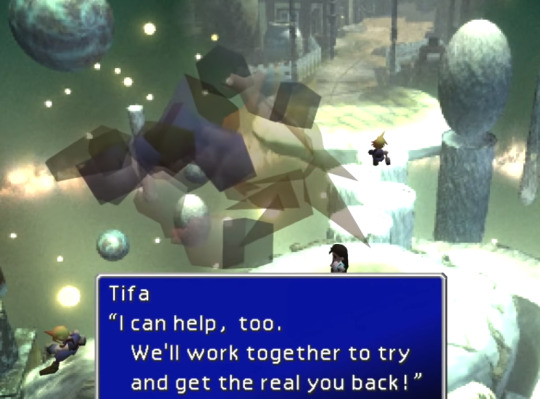
A lot of the confusion stems from a fundamental misunderstanding of what actually needs to happen in the Lifestream and why. Thus, using specific details from the sequence, I’d like to present my take on the following:
Part 1: What Cloud needs to accomplish in the Lifestream to advance the plot
Part 2: Why Tifa is the only person, living or dead, who can resolve Cloud’s crisis, where we will discuss fun things such as:
Why Tifa is the the focus of his greatest flaw
What Tifa’s presence in the Lifestream accomplishes
Part 3: Why those “Tifa-less” fan theories just can’t work
This is a very long ride so let’s get to it!
Part 1: What Cloud needs to accomplish in the Lifestream to advance the plot
Many fans think that all Cloud needs to accomplish in the Lifestream is prove to himself that he existed before the Nibelheim incident. This seems to make sense, as Cloud’s mental break at Northern Crater was due him losing faith that he was truly Cloud Strife of Nibelheim, right?
But that isn’t the only thing that needs to happen. Consider this: Ex-SOLDIER Cloud does believe that he is Cloud Strife of Nibelheim for almost the entirety of the game’s first half. However, Ex-SOLDIER Cloud couldn’t correctly remember the Nibelheim incident back at Kalm, and he occasionally exhibits alarming behavior (his headaches, his attempts on Aerith’s life). So the goal of the Lifestream sequence is not to restore Cloud to this previous flawed state, but... to accomplish something more. Accomplish something that will resolve the aforementioned issues by strengthening him against Jenova’s influence.
There are two ways to strengthen Cloud against the influence of the Jenova hivemind:
Rebuild Cloud’s sense of self by identifying and accepting his personal weakness -- without writing a whole other post, individuals injected with Jenova cells are susceptible to influence by the Jenova hivemind if they have a weak sense of self and weak will; thus, Cloud needs to fully understand and accept who he truly is, weaknesses and all, in order to withstand further Jenova tampering
Establish the truth of the Nibelheim incident -- until then, silver-tongued Sephiroth/Jenova will always be able to cast doubt on Cloud’s existence using the discrepancies between Cloud’s and Tifa’s memories
And wouldn’t you know it, but the Lifestream sequence does end up accomplishing all three of these things. It:
Proves that Cloud Strife of Nibelheim existed before the Nibelheim incident
Rebuilds Cloud’s sense of self by identifying and accepting his personal weakness
Establishes the truth of the Nibelheim incident
Something to note re: #3 - Establishes the truth of the Nibelheim incident: this is actually extremely challenging to do, as the truth lies solely within Cloud, but is blocked due to his own mental weakness. This is why the Lifestream sequence begins with Cloud trying and failing to correctly remember the Nibelheim incident: while he superficially does want to understand the truth of the incident, deep down he does not want to acknowledge his personal failings that are on full display in the true memory. It is only after Cloud accepts his personal weakness that he is able to face the full truth, failings and all.
So really, #2 - Rebuild Cloud’s sense of self by accepting his personal weakness is the most pivotal portion of the Lifestream sequence, as this empowers Cloud on a personal level and also allows him to remember the Nibelheim incident correctly. And as it happens, this is the portion that only Tifa can help with.
Part 2: Why Tifa is the only person, living or dead, who can resolve Cloud’s crisis
We’ve just discussed how rebuilding Cloud’s sense of self by helping him accept his personal weakness is one of the most important goals of the Lifestream sequence--and now I’d like to explain how this can only be accomplished with Tifa’s help and no one else’s.
>> Tifa is the focus of Cloud’s greatest weakness
I think that every fan, including non-shippers and anti-Tifa fans, will agree that Cloud is insecure and has a desperate need for acceptance. But because he needs to resolve and accept this greatest weakness, his shame, the real question is... when did it become pathological? What is it focused on, and what makes it his tragic flaw? The answers will give us a hint as to what Cloud needs to come to terms with his true self.
This is shown to us in the Mt. Nibel memory--the day Tifa’s mother died. And it is actually explicitly told to us by a very important entity...

...A blacked out, silhouetted version of Cloud that casually climbs out of his slack adult form. This silhouetted version of Cloud represents the deep dark secrets about himself that Cloud has hidden away for so long, and it tells us what exactly is on its mind.
Let’s review everything Deep Dark (DD) Cloud says:
Young Cloud: I began to think I was different... That I was different from those immature kids. That then... maybe...
DD: Just maybe, they would invite me in. I thought that might happen, so I hung around...
...
DD: That night I called Tifa out to the well... I thought to myself Tifa would never come... that she hated me.
...
YC: This was the day...
DD: Tifa's mother...
T: The day Mom died...
...
DD: I don't remember the path I walked. Tifa missed her step. I ran to her... but didn't make it in time. Both of us fell off the cliff. Back then, I only scarred my knees but...
...
DD: Tifa was in a coma for seven days. We all thought she wouldn't make it. If only I could've saved her... I was so angry... Angry at myself for my weakness. Ever since then, I felt Tifa blamed me... I got out of control... I'd get into fights not even caring who it was.
(fade to black)
DD: That was the first time I heard about Sephiroth. If I got strong like Sephiroth, then everyone might...
(return to the nexus/Cloud’s mind)
DD: If I could just get stronger... Then even Tifa would have to notice me...
Many fans fixate on DD Cloud’s very first line (”just maybe, they would invite me in”), and I understand why--not only is the first satisfying eureka moment in the Lifestream, but it’s also deeply relatable. Who hasn’t felt like an outsider and wanted acceptance and approval? These same players then attribute all of Cloud’s motivations to this relatable feeling. “Cloud had a deep inferiority complex and wanted to prove himself to the world and that’s why he pretends to be the super coolest SOLDIER ever.”
But that interpretation completely ignores the other 90% of what DD Cloud says. The other 90% of Cloud’s shame is wrapped up in Tifa. “Tifa’s mom died... I tried to save Tifa, but I got off relatively unscathed while she suffered terrible injuries... Tifa must have hated me... I thought Tifa wouldn’t come to the well because she hated me... I wanted to be like Sephiroth so Tifa would notice me...” Even if a little bit of Cloud’s motivations are attributable to the contempt of the townspeople, the vast majority of it is focused on Tifa--would she always hate him? Would she ever notice him? Could he ever be worthy of her? DD Cloud’s dialogue reveals that Cloud’s shame and tragic flaw is completely centered on his need for Tifa’s approval. Perhaps only his pedestaled perception of Tifa, but Tifa all the same.
The "Cloud wants to impress all the kids” interpretation also ignores what the cinematography of this scene is telling us. The “big takeaway” of the Nibelheim memory and DD Cloud’s reveal is the single sentence that DD Cloud speaks after the memory is over and lights turn back on and they’re back at the nexus--the sentence that he “took away” from the previous scene. And look! It’s this one!
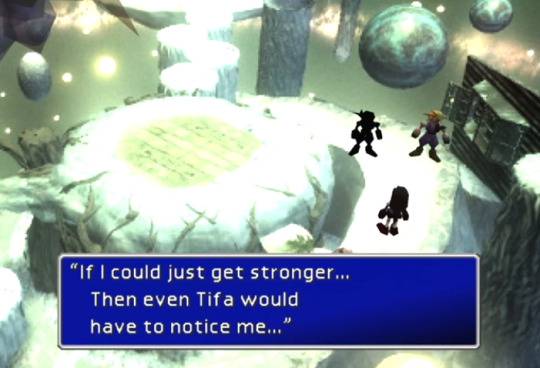
DD: If I could just get stronger... Then even Tifa would have to notice me...
THIS. THIS IS IT. This is the root of Cloud’s shame and explains his pathological need to misremember himself as a SOLDIER and thus misremember the Nibelheim incident at all costs: he was ashamed at his inability to rescue Tifa and Mt. Nibel, so he swore to himself that he would get stronger to earn her notice. Cloud needs to be strong so Tifa will notice him; thus, Cloud creates an illusionary world where he misremembers his own identity and the Nibelheim incident in a way that makes him a strong man that is finally worthy of her.
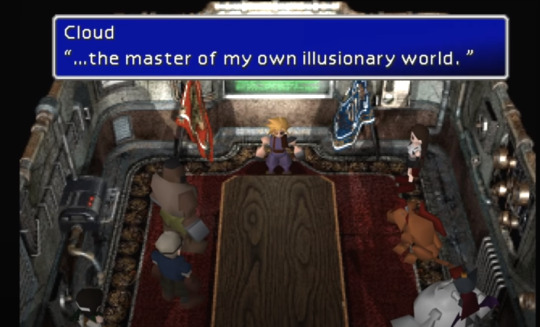
This is the personal weakness that Cloud needs to resolve in the Lifestream with Tifa’s help: he needs to learn that it is okay to not be the strong man, because Tifa will accept him regardless.
(And, sidebar, Cloud’s need for Tifa’s approval is not just some fleeting childhood dream in the distant past--even in present day, Ex-SOLDIER Cloud can’t bear to remember how he failed to be a stronger man for Tifa, because even in the present day, Tifa’s opinion of him is all that counts.)
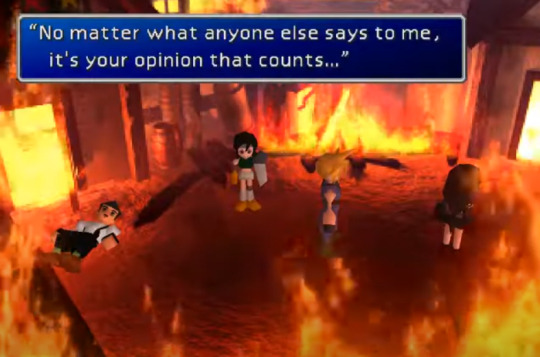
>> What Tifa’s presence in the Lifestream accomplishes
While the above proves how Cloud’s personal weakness (his tragic flaw) revolves around Tifa and his feelings for her... we now need to answer, why does Cloud need Tifa to be in the Lifestream with him to work through these feelings? And this, I believe, comes down to two, very subtle, shown-not-told points:
Cloud’s honesty depends on Tifa’s presence, as Cloud’s need for Tifa to understand his feelings is greater than his need to hide his painful weaknesses from himself
Cloud draws strength from “his important person” (no matter how you want to define her: his main motivation, the person he’s been in love with forever...) accepting him and providing moral support
Let’s work through these in order.
REASON #1 - Cloud’s honesty depends on Tifa’s presence, as Cloud’s need for Tifa to understand his feelings is greater than his need to hide his painful weaknesses from himself
This one is very easy to miss, but is illustrated in two key ways. First, did you know that DD Cloud speaks early on in the Lifestream, even before the Mt. Nibel memory? His two lines are:
T: Now that you mention it, why did you want to join SOLDIER in the first place? I always thought it was a sudden decision you made...
DD: ...I was devastated. ...I wanted to be noticed.
Adult Cloud: ...I was devastated. ...I wanted to be noticed. I thought if I got stronger I could get someone to notice...
T: Someone to notice you...? ...who?
DD: Who...? ...You know who! ...You, that's who.
AC: You...
T: ...Me? Why!?
YC: Tifa... did you forget... about those days?
Those two lines are definitely DD Cloud’s; in the earlier photos, we see that DD Cloud’s speech bubbles don’t have a background box. These new two lines are similarly background box-less. Moreover, these lines cannot be attributed to Adult Cloud or Young Cloud. See the below comparison photos:
DD vs. Adult Cloud’s vs. Young Cloud’s speech bubbles:
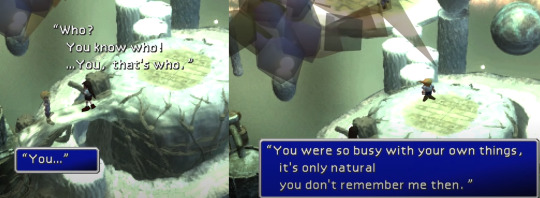
What’s very interesting is the tone of the second line (”Who...? ...You know who! ...You, that's who”); this is the only exclamation that Cloud uses in the entire sequence until all the revelations of the Nibelheim Incident re-memory. DD Cloud is startled into indignance that Tifa has no idea that he’s been trying to impress her all along. (DD Cloud is like, “Tifa, the past 12 years of my life were entirely motivated by you, are you telling me that literally none of this has gotten through to you!!?”) Even if DD Cloud were dormant and hidden this entire time, the ignominy of Tifa not understanding the effort he made for her for 12 years is just too much for him to suffer through silently.
The significance of this moment is actually incredible: the Deep Dark Secret that Cloud has been hiding from this entire time, the Deep Dark Secret that Cloud would rather die/go comatose than acknowledge... this Deep Dark Secret indignantly reveals itself just because Tifa apparently doesn’t know about it! Cloud’s need for Tifa to understand his Deep Dark Secret is even greater than Cloud’s need to be honest with himself to prevent his clone coma.
And this becomes a trend that continues up to the Mt. Nibel memory--Cloud is reluctant to revisit these memories, and only does so because he wants Tifa to understand his feelings. Almost every other line we see Cloud’s reluctance, his disbelief at Tifa’s cluelessness, and him forcing himself to open up so Tifa can know what he’s been obsessing over for 12 years. See the dialogue yourself (my notes in square brackets):
YC: Tifa...... did you forget...... about those days? [Cloud’s disbelief that Tifa doesn’t know]
...
YC: It's important to me... I hate to say it but... It's a very important memory... [Cloud’s reluctance to revisit the memory] Do you want to see it? Come on, hurry. [Cloud’s need for Tifa to see]
...
AC: ...a sealed up secret... wish... Tender memories... no one can ever know... [Cloud’s reluctance to revisit the memory]
YC: Do you know where this window goes to, Tifa? [Cloud’s disbelief that Tifa doesn’t know] Fine... I'll go. [Cloud’s need for Tifa to see]
Again, this is a tremendous moment. Cloud is only motivated to honesty for Tifa’s benefit, and takes each reluctant step towards the truth because Tifa is right next to him with all her cluelessness. In his desire to be honest for Tifa, Cloud ends up being honest for himself as well... Tifa’s presence is the only reason why Cloud can be honest to himself in the Lifestream. If not for her, Cloud never would have broached those painful memories and never would have resolved his crisis.
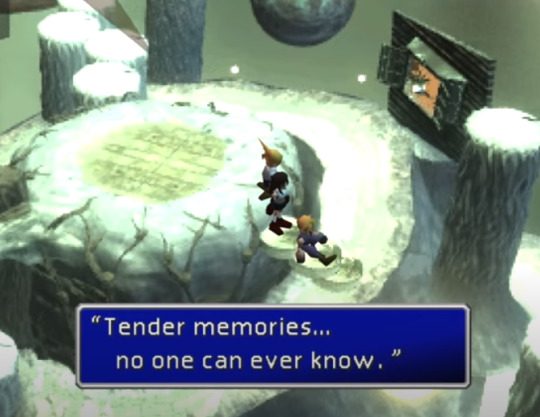
One last thing I want to highlight is that Cloud wouldn’t open up like this for anyone. Reread this line: “Tender memories... no one can ever know.” If anyone else was in the Lifestream with Cloud--or if it was just Cloud by himself--DD Cloud would never have felt the need to express himself. He would have stayed hidden, preferring for Cloud and the others to forever perceive him as the super cool SOLDIER instead of a “weak man” who couldn’t even save the girl he loved back on Mt. Nibel or fulfill his promise to her.
REASON #2 - Cloud draws strength from Tifa (the object of his shame/his fellow Nibelheim survivor/the person he’s been trying to win the attention of forever/the person he’s loved for 12 years) accepting him and providing moral support
This one is the most subtle as it’s mostly shown and the dialogue is not explicit, but the scene simply does not work without it. It is thanks to Tifa’s support that Cloud is brave enough to correctly remember the Nibelheim incident.
After DD Cloud says his final line in the nexus, he looks away from Tifa.
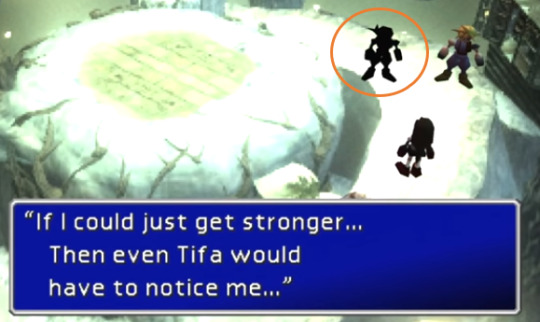
Can’t even make eye contact with her, even though he was able to back in the Mt. Nibel memory. He must think that now that all the cards are on the table, Tifa will reject him in some way. Maybe she will heap on the blame for failing to save her at Mt. Nibel, or be disgusted that he dared try to win her notice, but whatever it is, he expects some kind of rejection. But... that’s not what happens. Instead, Tifa implicitly absolves him of any guilt or shame by apologizing to him instead.
DD: If I could just get stronger... Then even Tifa would have to notice me...
T: So that was it... Sorry, Cloud. If I had only remembered more clearly what happened, I could have done something sooner...
...
So not only does Tifa fail to reject Cloud, but she also implies that Cloud is completely faultless, as she would have corrected the townspeople’s misconceptions about Cloud if she’d only known. Tifa plainly supports Cloud and does not blame him for Mt. Nibel.
Moreover, she continues to encourage Cloud after this moment. Soon after, Tifa exclaims:
T: Hang in there Cloud! Just a little longer! You've almost found the real you!
It’s only after Tifa’s words of encouragement that both Adult Cloud and DD Cloud merge into one another. This is a powerful moment; it shows that Adult Cloud hasn’t lost those deep, sealed away feelings, but has finally made peace with them. Cloud’s deep dark feelings are still a part of him but no longer hold him back; he no longer needs to misremember himself as a strong man for Tifa because Tifa accepts him as he is.
The game then explicitly shows Tifa and Cloud behaving with a togetherness that we haven’t seen the entire game--these two have finally overcome the distance between them and are able to tackle the world as a team. Cloud can finally be brave because he knows Tifa won’t leave his side.
And the game shows us this. First, Tifa, Adult Cloud, and DD Cloud all resolutely hold their fists up in unison (so ‘90s shounen anime, I love it):
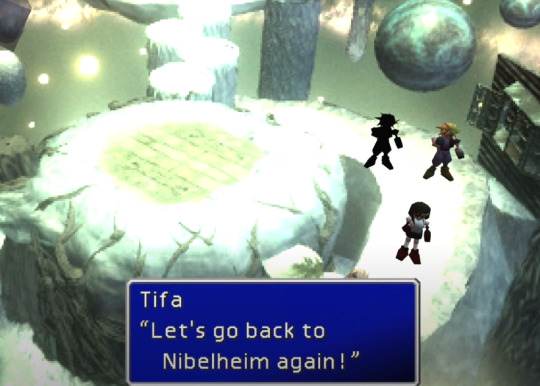
Then they run into the Nibelheim memory together, side by side, literally in lockstep--look how every foot step is in sync:
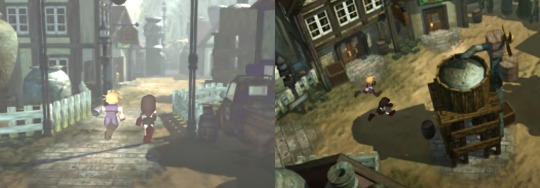
This is different from previous memories, where one is always following the other or doing different things. What it shows us is that after Cloud comes clean about his shame and Tifa accepts him as he is, the two are closer together than ever before. Cloud feels brave enough to properly remember the Nibelheim incident when he has Tifa with him.
And it’s telling that the very first moment Cloud tries to remember is...
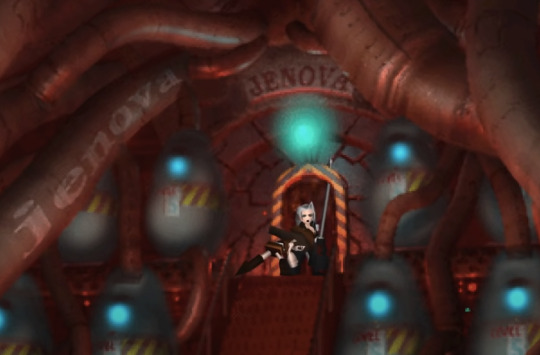
...the memory of Tifa being injured. Not the memories of him stabbing Sephiroth (or being stabbed by him), not the memories of Zack being injured, not the memory of Cloud putting on his helmet to hide his shame. If he were still afraid of Tifa’s disappointment, Cloud would not choose to relive this as his very first memory. Yet Cloud picks a painful moment that includes Tifa, trusting that they can work through it as a team. I know I keep on saying it, but it’s the truth: Cloud is empowered to fully face his deepest shame and weakness because he knows that the real Tifa accepts him as he is and will stay by his side.
Part 3: So what does this mean for those “alternate fan theories?”
Phew! That was a lot. Let’s recheck our notes on what the Lifestream scene needs to accomplish:
Prove that Cloud Strife of Nibelheim existed before the Nibelheim incident
Rebuild Cloud’s sense of self by identifying and accepting his personal weakness
Establish the truth of the Nibelheim incident
Given what we just discussed, any substitute for Tifa would accomplish some, but not all of the above three points.
So for those fans who say...
>> “Cloud could have done it all by himself” - did... did you miss the giant floating confused Cloud?? He was trying and failing to figure it out by himself because he couldn’t bear to be honest, even for his own sake. What ultimately turns the tide is Cloud’s need to express his true feelings to Tifa, and how it outweighs his need to hide his weakness from himself; thus, without Tifa’s presence, Cloud cannot be honest with himself and cannot resolve his identity crisis.
And PS, when Tifa says, “Cloud found himself on his own,” she’s referring to Cloud’s choice to reveal his weakness to her, and Cloud’s bravery at confronting the Nibelheim incident afterwards. She’s not saying “oh I didn’t need to be there at all and Cloud really just needed a couple extra minutes and I was basically scenery lol.” She’s complimenting Cloud for the radical honesty/personal strength that allowed him to finally express his true thoughts to her and thus to himself.
Verdict: Cloud gets half points for #2 (accept personal weakness) and #3 (remember Nibelheim) because ultimately he’s the one who decides to reveal the truth of those moments. Cloud gets 0 points for #1 (prove his existence) because he still needed to double-check with someone who knew him as a child.
>> “any childhood friend could have helped Cloud” - sure, that childhood friend could help accomplish #1 (prove his existence), but as we previously discussed, Cloud is only motivated to be honest with himself when he realizes that Tifa doesn’t know the extent of his feelings for her. If he never that Tifa was clueless, then Cloud would have kept the Mt. Nibel memory locked away from himself and everyone else.
Verdict: A Nibelheim rando would be able to accomplish #1 (prove his existence) but would fail to accomplish #2 (accept personal weakness) or #3 (remember Nibelheim)--Tifa is needed for DD Cloud to come clean, and Tifa’s unique role allows her to support Cloud while he works to remember the truth of the Nibelheim incident.
>> “Aerith (+Zack) could have taken care of it” - sure, Aerith (+Zack) could have shown Cloud the truth of #1 (prove his existence) and #3 (remember Nibelheim), because they both could observe the truth of those events.
But how could they help Cloud with #2 (accept personal weakness), when Cloud has been trying to hide his weakness all along and would probably feel even worse in comparison to these two shining beacons of excellence? And there’s some proof to this line of thinking; in CC, Cloud explicitly does not want to share his feelings for Tifa with Zack; and in OG, Cloud arguably tries to preserve the hero fantasy of being the Coolest SOLDIER Ever for Aerith. I can’t imagine Cloud wanting to share these “tender feelings that no one can ever know”/his love-induced weakness with anyone except for the object of those tender feelings. So #2 is still allllll Tifa, baby.
Verdict: Aerith (+Zack) could take care of #1 and #3, but they could never get Cloud to open up about #2--and even if they did, they were not the “victims” of “Cloud’s failure,” so their forgiveness/acceptance would mean nothing to Cloud and would not help him accept his own weakness.
Final thoughts:
>> Fun theory, but Cloti isn’t essential for it... the sequence still works even if Cloud’s tragic flaw is a raging inferiority complex.
There’s a difference between something technically working vs. what the game actually shows us. Yes, it could work if Cloud has a generic inferiority complex that has nothing to do with Tifa... but the game’s explanation of Cloud’s psyche (DD Cloud’s dialogue) spends >90% of its wordcount on Tifa. This argument essentially works if you throw out >90% of what the game was trying to tell you. Cloud’s entire inner world revolves around Tifa and stuffing your fingers in your ears and loudly saying lalalala does not change that.
>> But didn’t Cloud choose to hide his face because he wanted to hide his failure from everyone in town, not just Tifa, which would prove it was just a generic inferiority complex?
Sure, Cloud says:
C: I... never made it as a member of SOLDIER. I even left my hometown telling everyone I was going to join, but... I was so embarrassed. I didn't want to see anyone.
Off that line alone, one would think that he is ashamed to show his face to anyone in his hometown.
But the game shows us that Cloud specifically decided to hide when he saw Tifa.
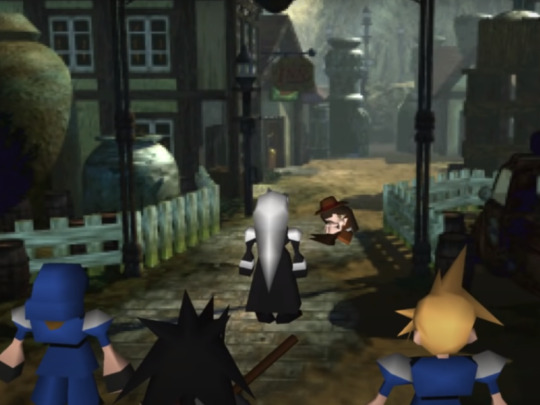
Look how this baby is prepared to stroll into town with his Chocobo head free in that Nibelheim breeze. Not what you’d expect someone to do if they’re trying to hide from everyone, right?
But as soon as Cloud notices Tifa, he runs offscreen and puts his helmet back on while Zack can only shrug a “you do you” in reply.
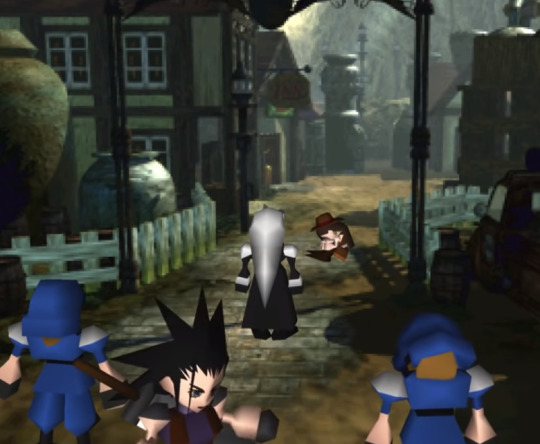
It’s Tifa that Cloud couldn’t bear to disappoint. Not the rest of the town.
>> That final “resolution” moment after the Mt. Nibel incident is a little weak, isn’t it? There’s nothing explicitly saying that Tifa accepted Cloud and that’s why he’s able to shake off his shame and remember the Nibelheim incident properly.
It’s true that so much of this is implicit (the absence of Tifa berating Cloud, Tifa wishing she could have helped Cloud more back then), or shown-not-told (Tifa and Cloud raising their fists in unison, Tifa and Cloud running in unison). The OG script also jumps right to Tifa’s exclamation that the Mt. Nibel memory proves Cloud is a real person, not really lingering on Tifa accepting Cloud or anything. To be honest, the biggest reason why I even put together this theory is because 1 + 1 ≠ 4, but somehow that’s what happens in the Lifestream if we remove this shame/acceptance aspect. Also... how unsatisfying and uncharacteristic is it for Cloud to just feel ashamed that he failed to save Tifa, then for that shame to be resolved during the Nibelheim incident re-memory with a “oh it’s not that bad, at least you saved her during the Nibelheim incident so that mitigates it”? Or for it to not be resolved at all?
If Cloud was so deeply ashamed that he’d prefer to become a potato instead of face these memories, then I can’t imagine that facing the memories with zero support from Tifa would help him feel confident enough to tackle the Nibelheim re-memory. I highly suspect that this scene will be expanded upon in the Remake to explicitly highlight Tifa’s acceptance, resulting in Cloud’s readiness to expose his true memories to Tifa and himself.
#final fantasy vii#ffvii#ff7#tifa lockhart#cloud strife#cloud x tifa#cloti#im sorry this is so long#i saw so many bad takes on the lifestream this month#i needed to get this out of my system#thank you to everyone who managed to make it to the end i appreciate you and love you
155 notes
·
View notes
Text
The Girl Who Gets to Have It All: Buffy Summers
So with @linkspooky‘s encouragement, I have binged Buffy the Vampire Slayer and relived my childhood culture. And, it's a 10/10 for me. Not that it doesn't have flaws, but it's genuinely one of the best stories I've seen, with consistent character arcs, powerful themes, and a beautiful message. It's also like... purportedly about vampires and demons and superpowered chosen ones, but it's actually all about humanity.
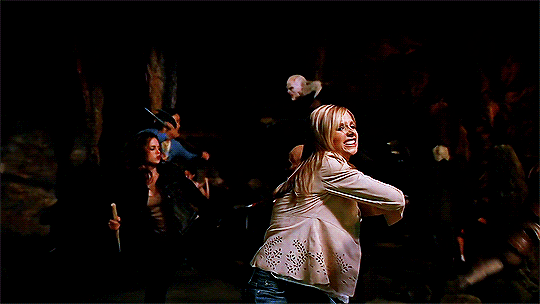
Buffy was able to be a teenage girl, allowed to like the things teen girls are scorned for (boys, shopping, etc), to be insecure about the thing teenage girls are insecure about (future careers, dating, school, parents), and to be a superhero with its good and its bad aspects. The story wasn’t afraid to call Buffy on her flaws (sometimes she got in a very ‘I am the righteous chosen one’ mode) and to respect and honor each of her desires (to be a good person, to be loved, and more). The story listened to what she wanted and respected her desires, giving her the challenges needed to overcome her flaws while also never teaching her a lesson about wanting bad boys or romance is silly or any manner of dark warnings stories like to throw at teenage girls.
It respected teenage girls--nerdy girls like Willow, jocks like Buffy, lonely wallflowers with trauma like Dawn, and popular/snobby ones like Cordelia, girls gone wild like Faith. It never once reduced them to the stereotypes that were lurking right there: each character was fully rounded, human, flawed and yet with respected interests and goals. This is so rare for a story that I’m still in awe.
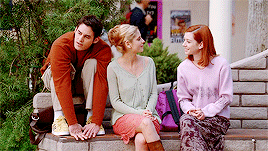
The story as a whole follows Buffy from 15 to 21, of her as she grows from teenager to adult. She acts like a teenager and grows to act like a young adult, wrestling with loneliness and duty. The adults, like Giles, Joyce, and Jenny, are not perfect either, but neither are they “bad parents” or “bad mentors” necessarily. Joyce in particular says something terrible to Buffy, but she tries to do better, and it’s rare to see a parent in YA stories shown with such nuance. Basically, it wrote the long-lasting adult characters as human beings, too.
Speaking of growing up, I appreciated how Buffy’s love interests mirrored this. Angel was someone Buffy loved and admired, wanted to be like, but who was always either extreme good or extreme bad, and combined with Buffy’s own tendencies towards black-white thinking, made for a beautiful relationship to help her grow, but didn’t necessarily form a foundation for a long-term partner. Spike, on the other hand... they both saw each other at their worst and were drawn to each other even then, and were inspired to become better because they couldn’t bear to be a person who treated the other person so wrongly. They pushed each other to become the best them they could be, and believed in each other. Also, Spuffy is an enemies to lovers ship for the ages.
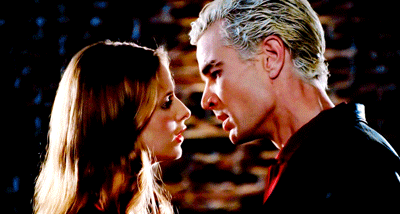
(Also, most of the other ships were well-done or at least can be understood. Riley was very obviously wrong for Buffy which paralleled Harmony and Spike in being 100% wrong for each other. Cordelia and Xander were a fun ship even if we all knew it would never last, and Willow and Oz were beautiful and cute. But Xander and Anya and Willow and Tara? OTPs. As were Giles and Jenny, the librarian and the computer teacher.)
That said, it’s not a perfect series. No story is. All of the characters and ships had problematic aspects to them worthy of critique, and the writing is very 90s in a lot of ways. It’s a product of its time, and in many ways it’s good society has progressed beyond some of the tropes/metaphors used in the show. In other way, though, the show was ahead of its time, and in a good way it wasn’t bound by the fear of purity policing with its takes on redemption (many characters would never fly today).
So, in order of seasons ranked from my very favorite to my “still enjoyed it very much” (no season was actually bad, imo), here’s my review. I’ll also review my top 10 villains in the show, because Buffy does villains very well in terms of the redeemable and irredeemable.
Season 7: Yep, the final season was my favorite.
Overall Opinion: Buffy's finale is literally "f*ck them men, our power is ours" and while it seems cheesy it actually works (also, f*ck in both a literal and figurative sense). The series strongly hit all the themes: love as strength, and redemption. Buffy consistently shows love as her strength--*all* kinds of love. Friendship w Willow/Xander, familial with Joyce/Dawn, romantic with Spike/Angel. These types of love are also never pitted against each other as is so often the case in current-day media. It's beautiful. Also, Spike’s confrontation with Wood was so powerful in terms of exploring forgiveness, redemption, and reconciliation: where they overlap and where they don't, and what it means to move forward.
Unpopular Opinion: I have seen a lot didn’t like the inclusion of Potential Slayers, and while I agree they could have been better incorporated/characterized, it was a great way to show Buffy’s final stage of growing up to be ending her chosen one status and projecting/multiplying her powers over the world.
Biggest Critique: Kennedy was female Riley--the anti-Tara to Riley’s anti-Angel (by ‘anti’ I mean opposite in every way). Kennedy was annoying and immature. Her role, like Riley’s, was less about exploring her as a character and more about her just being stamped as “love interest: lesbian.”
Favorite Episodes: Beneath You, Lies My Parents Told Me, Touched, Chosen
Season 6:
Overall Opinion: I said this on Twitter, but I felt like this was Buffy’s The Last Jedi or Empire Strikes Back moment. It is polarizing and dark, deconstructing the tropes it stands on--but by digging to the core of these tropes, it actually makes what’s good about them shine brighter. Everyone’s enemy was the worst versions of themselves. Giles left Buffy, Willow's struggle to relate to the world led to her trying to destroy it, Buffy hurt everyone through her anger, Xander abandoned Anya at the altar, Spike... yeah. It ages well as an integral part of the story, and the Trio were eerily prophetic.
Unpopular Opinion: Dawn is a great character with a good arc. A traumatized teen acting out and struggling to come to terms with loss and identity? She wasn’t whiny; she was realistic.
Biggest Critique: Willow’s addiction coding (I’ll discuss this below) and Seeing Red as an episode. I see the argument for both of its controversial scenes from a narrative perspective: Willow starts the season not grieving Buffy but instead being determined to fix it with magic and needs to learn to grieve, but. Still. Bury your gays is not a good look. For the Spike scene... he conflates sex/passion and violence (”love is blood, children” is something he said way back in season 3), but like Tara’s death, it had more to do with Spike (as Tara’s death did for Willow) than with Buffy’s arc, and as for the actual execution... they really botched that. Did it like... have to go on that long or go that far? No. Also, the framing was good, but inconsistent with the rest of the series (Xander to Buffy in the hyena episode, Faith to Xander and to Riley, etc.)
Favorite Episodes: Once More With Feeling, Smashed, Grave
Season 3 (tied with Season 5):
Overall Opinion: The opening continuity of Buffy meeting Lily/Anne after saving her life in Season 2 was sweet. The Witchhunt episode had really powerful subtext: stories of deaths that aren’t even true are actually demons that possess the town and convince them to turn against their children in the name of protecting the children. It’s a good commentary on, oh, everything in society. Faith’s character arc was fantastic, and her chemistry with Buffy was off the charts (look, I may be Spuffy all the way, but Fuffy has rights). The finale was satisfying in so many ways, seeing the entire graduating class unite to destroy the Mayor and the school with it, symbolizing Buffy et al’s readiness to move on to college. Oz's relationship with Willow was very sweet and meaningful for a first romance for Willow.
Unpopular Opinion: I actually don’t really have one. Maybe that the miracle in Amends was earned? I think you can make a decent case that Season 3 is the best written of the seasons, but can only truly be thematically appreciated to its full potential in the light of subsequent seasons (which finish Faith’s arc and deconstruct Buffy’s).
Biggest Critique: It forgot Buffy killed the hyena guy in Season 1, making her continual insistence that she can’t kill people very ?????
Favorite Episodes: Lovers Walk, Amends, Graduation Day Part 2
Season 5, which ties with Season 3:
Overall Opinion: The entire season is about family and what it means, from Tara’s to Buffy’s to the Scoobies. I loved Glory aka Enoshima Junko as the Big Bad, I loved Dawn’s interesting meta commentary on retconning (like, the fact that she’s retconned in matters), and most of my ships are still alive. Joyce’s relationship with Spike is one of the most heartwarming aspects, and Spike’s arc’s desire is clearly highlighted: he wants to be seen as a person. The episodes after Joyce’s death are the most honest portrayals of grief I’ve ever seen, and absolutely brutal to watch.
Unpopular Opinion: Buffy’s choice at the end seems a deliberate inversion of her choice at the end of Season 2 (sacrifice a loved one to save the world), but it actually isn’t: much like at the end of Season 2 where Buffy skips town because she’s devastated after killing Angel and doesn’t want to sort out being expelled, her mom knowing she’s the slayer, and her own trauma, Buffy’s sacrifice here was as much about her wanting the easy way out of relationships, family, college, etc. as it was about saving Dawn. Buffy’s death is coded as a suicide, which Season 6 emphasizes as well.
Biggest Critique: Like Season 3, I don’t have a lot to critique here. I wish the suicidal coding had been a little more obvious in Season 5 itself, but also I’m not sure it could have been more obvious; it’s pretty apparent if you pay attention. Maybe also that Buffy and Riley’s relationship failing should have been more squarely blamed on Riley, you know, being insecure and cheating.
Favorite Episodes: Family, Fool for Love, Intervention.
Season 2:
Overall Opinion: Heartbreakingly tragic but exciting and revealing at the same time. It asked the viewer interesting questions about redemption and forgiveness and atonement through Angel being honest about his past, and then decided to show us his past now reenacted, challenging us. And still, we saw them save him in a parallel to saving Willow in Season 6 (but Season 2 was tragic because it wasn’t enough, while Season 6 was not). Jenny’s death was agonizing, and the scene were Angel watches Buffy, Willow, and Joyce get the news through the window was powerful. We didn’t have to hear them to get the grief.
Unpopular Opinion: Jenny’s death isn’t a fridging; it works for her arc too when you consider her history. She worked to save the person whose life she was tasked to ruin, and it cost her her own--yet she still succeeded, because Jenny brought joy and wisdom to the show. Kendra’s death, on the other hand... was because they needed the stakes to be high--but we already knew that before she died. So, her death was useless.
Biggest Critique: The subtext was Not It. It was essentially “do not have sex. Your older boyfriend will lose his soul, kill your friends, you’ll lose your family, your school, your home, and have to kill your true love or else hell will literally swallow earth.”
Favorite Episodes: School Hard, Passion, Becoming Part 2.
Season 1:
Overall Opinion: I really liked it; it’s just lower on this list because the others are just better. It’s a great introduction to the series and to its characters, from Giles to Buffy to Willow to Jenny to Cordelia. It has great subtext a lot of the time (for example, Natalie French as She-Mantis is a literal predatory bug who engages in predatory behavior with students). Additionally, it subverts the typical YA trope of two guys and a girl, in which the girl is usually the least interesting character. Buffy and Willow were both fully fledged characters from the beginning with distinct strengths (even before Willow became a witch, as she wasn’t one in season 1 yet), while Xander was the more ordinary of the group.
Unpopular Opinion/Biggest Critique: Xander’s arc showed its first flaws that unfortunately continued throughout the series: his writing was either very good or very indulgent in ways it never was for other characters. (cough, the hyena episode, cough, in which he gets to skirt responsibility--and acknowledges that he is skirting it--for something the show will later hold others to account for). Xander’s just kind of inconsistent, which weakened his character over all. (Which is why both his love interests--Cordelia and then ultimately Anya--were good for him: they did not indulge him.)
Favorite Episode: Witch, Nightmares.
Season 4:
Overall Opinion: it’s still a good season. It’s a good portrayal of college and the growing pains of branching out, the strains of college growth on relationships (romantic and platonic). It shows us the first hints of Spuffy, giving us some serious Jungian symbolism between Spike and Buffy early on, and does well in establishing Xander/Anya and Willow/Tara as beautiful OTPs. Faith and Buffy’s foiling is fantastic. The Halloween episode was very fun as well. However, it suffers because its Big Bad, Adam, is not all that compelling thematically--yet, he could have been. See, the final battle pulls off the Power of Friendship in a really strong way but notably the season does not end there. Instead, it ends on dreams of each character’s worst fears, continuing what we saw in Nightmares in Season 1. Why? Because it shows us that the characters’ wars aren’t against monsters, but monsters of their own making: their flaws. Adam, as a literal Frankenstein, exemplifies this, but it wasn’t capitalized on as well as it could have been.
Unpopular Opinion: Beer Bad isn’t a bad episode, at the very least because Buffy gets to punch Parker. It’s not one of the series’ best, obviously, but it does give Buffy an arc in that she gets her daydream of Parker begging her to come back, but she has overcome that desire and her desire for revenge. If we wanna talk about bad subtext in Season 4, Season 2′s Not It sex subtext continues in the Where the Wild Things Are episode in this season; it’s a powerful callout of abusive purity-culture churches, until the fact that the shame creates a literal curse undermines the progressive message it’s supposed to send. Also, the Thanksgiving episode (Pangs) is a nightmare of white guilt and Oh God Shut Up White People.
Biggest Critique: Riley is awful. Like Kennedy, he had “love interest:normal” stamped on him and that was it. The thing is, he could have worked as an Angel foil, representative of the normal-life aspect of Buffy to Angel’s vampire/supernatural aspect, but the writers never explore this and seemed to even try to back away from that later on. They threw all the romantic cliches at the wall to see what sticks, from klutzy “I dropped my schoolbooks, that’s how we met” to cliché lines that had me rolling my eyes. Do you know how bad a romance has to be to make me dislike romantic tropes?
Favorite Episodes: Fear Itself, Hush, Restless
Villain rankings:
Dark Willow, the only villain to be truly sympathetic. While the addiction coding was insensitive and, while unsurprising for its time, aged extremely poorly. That said, Willow’s turn to the dark side after Tara’s death worked well for her character and the story: it was believable and paid off what had been building since Season 1's “Nightmares” episode (Willow’s inferiority complex).
Glory managed to be genuinely terrifying, and humorous/enjoyable too. Her minions and their numerous nicknames for Glorificus were hilarious, as was her intense vanity. Her merging with Ben--a human being who genuinely wanted to be kind and good--added complexity and tragedy to her role.
The First. A really good take on Satan. The seventh season as well as the First’s first appearance in season 3′s “Amends” had kind of blatant Christian symbolism, and so the First being essentially Satan works. Their disguising themselves as dead loved ones and the subtle manipulation they used to alienate people was really disturbing and well done.
The Mayor, who was a terrible person but a truly good father. He provided an interesting contrast to the normal ‘bad dad’ bad guy character, in that he provided Faith exactly what the other characters refused to: he saw the best in her and offered her parental support, while the heroes didn’t and wound up pushing her away.
The Trio, who were villains ahead of their time: whiny fanboy reddit dudebros, basically. The stakes seemed so much lower than fighting Glory, a literal god, the previous season. But that’s why they worked so well for Season 6′s human themes, and were especially disturbing because we all know people like them. I also appreciated the surprisingly sensitive takes on Jonathan and Andrew, who got to redeem themselves, but Warren did not, and I don’t think he should have either.
Angelus + Drusilla. I’m ranking them below the Trio because Angelus was just sooooo different from Angel that it was difficult for me to feel the same way for him. He was still Angel, so it wasn’t possible to enjoy his villainy, but he also wasn’t nearly as sympathetic as Dark Willow, had no redeeming qualities like the Mayor, and wasn’t as disturbingly realistic as the Trio. However, the emotional stakes were excellently executed with him as the Big Bad, in that you were never quite sure how to feel and it just plain hurt. Also, Drusilla was a favorite recurring character. She was sympathetic and yet batsh*t enough to be enjoyable as a villain at the same time.
The Master, who was just completely camp and really worked as an introductory villain. He was scary enough to believe he was a threat, and was funny enough to introduce the series’ humor as well. He was, like Glory, an enjoyable Big Bad.
The Gentlemen, the one-off villains of Season 4′s Hush who were genuinely terrifying. It’s not as if they got a lot of explanation or any backstory, but they didn’t need it.
Caleb, the misogynist priest. Fitting with the First’s Christian symbolism, Caleb serving as a spokesperson of all bad religious beliefs felt appropriate. He was also a good foil to Warren--being actually supernaturally powered instead of a wannabe--and to Tara’s family in being full-out evil. I despised him.
Snyder. Okay Snyder is not a Big Bad like Adam is, but let’s face it: Adam is lame compared to the other villains. But Snyder as a principal? He was so irritating and yet really well used in the series to critique overly strict, hypocritical teachers. Like, we all know teachers like him. I loved to hate him, and his ending was so satisfying.
#buffy the vampire slayer#btvs#spuffy#buffy summers#dawn summers#spike#angel#cordelia chase#btvs giles#willow rosenberg#tillow#tara maclay#anya jenkins#xanya#xander harris#jenny calendar#kendra young#faith lehane#hamliet reviews
161 notes
·
View notes
Note
Dear Chibimyumi, this is a rather odd question but do you think O!Ciel sometimes forgets he's a child? Because he says he wants to be seen as an adult...but I don't know if people actually see him as an adult or just a child who is mature for his age. I apologize for not explaining this well..
Dear Anon,
The Victorian Era was obsessed with manhood and unkind to all who weren’t “proper men”. That society would not miss out on any chance to remind O!Ciel of his “““sub-man””” status, let alone allow him a second to forget it.
It is not for nothing that he wears high heels in a vain attempt to be taken seriously. Even in 2020 men would receive much ridicule for wearing ‘women’s shoes (even though high heels were invented by men FOR men), let alone in the 1880s. But to O!Ciel, I think he rather be judged for ‘effeminate fashion senses’ than to be seen as a little child.
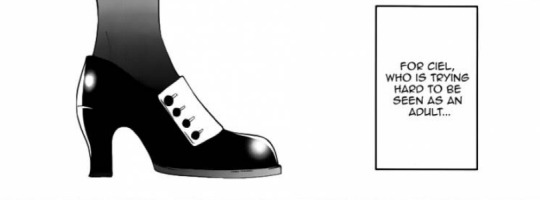
It is only those who feel like they have something to prove (whether it is justified or not is another story) who would be so aggressive about this ‘thing’ they wish to prove. Think of macho masculinity for example... truly confident men have no need to puff up. In Grell’s case, because people don’t believe that she’s a woman she feels like she has ‘something to prove’. So, to ““compensate”” for her male-coded body she therefore aggressively uses hyper feminine speech.
In O!Ciel’s case of course, he is for all intents and purposes a child, and therefore he does actually have something to prove. Whenever he says he is ‘not a child’, all people might do for him is shut up to prevent further provocation. And O!Ciel must know very well that people only spare him further comments because of his exceptionally noble status. He must know all the better that if he really were and adult, he’d never have to wear heels. (I count myself lucky that he never attempted wearing a fake mustache.)
Throughout the manga O!Ciel consistently does not get taken seriously because of 1. literally being a child, and 2. looking even younger than he factually is. Even though status wise he ranks much higher than Sir Randall, the latter still refers to him as a ‘cunning brat’, with much emphasis on the ‘brat’ part. Even O!Ciel’s allies refer to him as a child, with notable examples being Sebastian and Lau.
Sebastian and Lau know very well that calling the Earl a ‘child’ or a ‘brat’ stings the most, because O!Ciel couldn’t even defend himself without spouting an objective lie. In chapter 39 for example, Lau introduced O!Ciel to a stranger as ‘little child’, and though O!Ciel refutes the ‘little’, he did not deny the ‘child’ part.

The most beautiful ‘backup’ Sebas and Lau have is ‘The One and Only Royal Majesty the Queen Almighty’ herself. Every time the Queen addresses O!Ciel she calls him ‘cute boy’. (可愛い坊や・Kawaii Bouya). This ‘bouya’ in Japanese is used solely for VERY young boys; boys a bit older (12+) are usually referred to as ‘shounen’ (young man). The fact that even his boss calls O!Ciel ‘boy’ means that there’s only so much he can do to tell people they’re wrong. If he went too aggressive about it, he would be implying that the Queen is ‘wrong’ too, after all. And he can’t criticise the Queen!!!
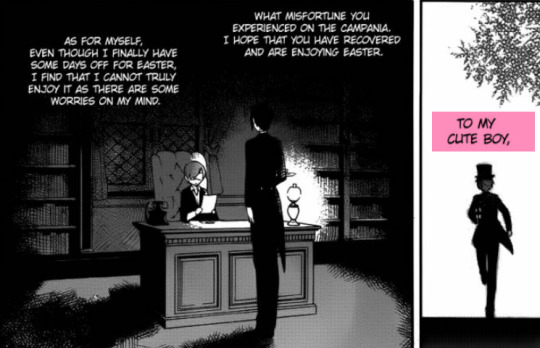
Duty vs Right
So, does O!Ciel sometimes forget he is a child?
I think a very important thing about O!Ciel is that he is hyper focused on his duty to the Queen and to his own revenge. I think he probably does realise that his duty is not something that would be fair to make any other child bear, but at the same time he also cannot convince himself to ‘indulge’ in his right as a child to live at peace. Not to mention, Sebas won’t allow him.
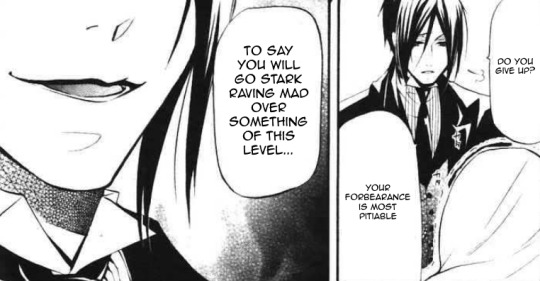
In the Circus Arc O!Ciel wasn’t even allowed a small break to recover from his triggered trauma. He moped for probably not even a few minutes and Sebas already tried to shame his master for being triggered and ‘threaten him out of trauma’ again. Trash Demon™ really takes fighting fire with fire quite literally.
Though Sebas is unforgivably abusive towards O!Ciel, he is also walking evidence for the boy that he is very worthy of respect. As explained extensively in this analysis, Sebas does not see his master any differently from older humans. Sebas judges somebody by their actions, not their identity. Though it had been a long road towards achieving mutual respect, O!Ciel did learn that the respect his butler has for him is truly earned.
O!Ciel is a strategist; his ability to play the cards he has been dealt is amazing. It is likewise because he knows he is a child, that he can use this card also in his favour when need be.

Conclusion
I think O!Ciel knows painfully well that he is a child and the social implications that come with it. He just doesn’t know what being a child is supposed to mean for him personally. Should he live his right as a child but be considered “sub-man”, or should he “grow up” to prove his worth? All in all it is not so weird, because in crisis some children are forced to mentally ‘grow up’ as a survival mechanism. These children never forget they are children; they might just not know what ‘normalcy’ is for a child. It would be reasonable to say this is exactly what happened to O!Ciel.
When he says “I am not a child” he does not mean “I am not underage”. I think he means: “take me as seriously as you would an adult.” As discussed before in this post, a strong thematic of this series is “you are who you prove yourself to be”. He knows he is more than what people give children credit for, and he wants that to be acknowledged.
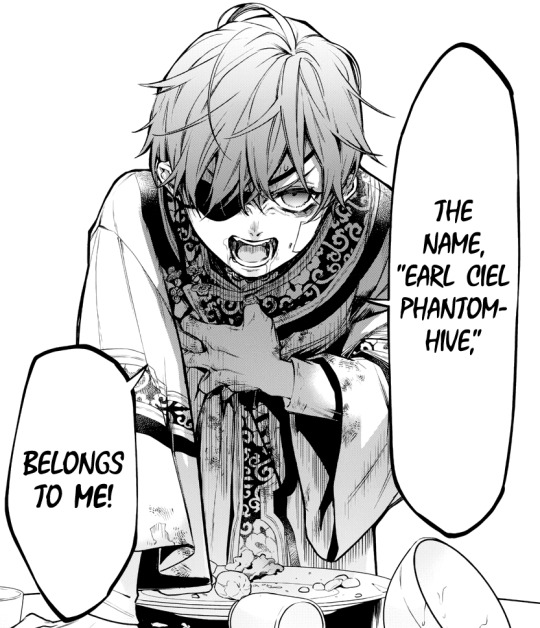
Our Ciel is SUCH a well written character, I love him with all my heart.
#A love letter to O!Ciel#O!Ciel#Our Ciel#Ciel Phantomhive#Analysis#Character study#Character Analysis#Bocchan#Kuroshitsuji#Black Butler
394 notes
·
View notes
Text
Respite (The Magnus Archives)
Whumptober 2020 Day Twenty Three: Exhaustion
Fandom: The Magnus Archives
Characters: Jonathan Sims, Sasha James, Tim Stoker, Martin Blackwood, Elias Bouchard, Rosie
Summary: Archiving is hard work, but someone’s got to do it.
Or, five people who caught Jonathan Sims sleeping on the job.
“Alright Jon, I think I’m going to head out-oh.”
Sasha had been gone for five minutes, tops. And yet here was Jonathan Sims, fast asleep in his chair and using her messenger bag as a pillow. And snoring.
They worked late into the night on some hunch Jon had - once he got on a research kick, there was no stopping him. Sasha wasn’t much better. They encouraged the worst in each other sometimes, but that’s how they got their sterling reputations as researchers. So this was not an unfamiliar scene.
But it was ten at night and Sasha had been looking forward to finally getting home, putting her feet up and knocking back a glass of wine or two. They had hit a dead end and wouldn’t be able to continue until tomorrow, anyway. Jon had begrudgingly agreed and she popped over to the bathroom only to return to...this.
It couldn’t be comfortable. Her bag was covered in buttons and pins, some particularly pointy. It wasn’t exactly clean either; it had been thrown on one too many questionable surfaces in the past few months. But Jon seemed comfortable, if his open mouth and the tiny bit of drool currently on the front pouch were anything to go by. Gross.
She contemplated waking him up. He would want to head home soon as well, the trains became entirely unpredictable the later it got and they boarded at the same station. But something stopped her. Maybe it was the dark shadows under his eyes, the small, wheezing breaths. The way his brow slightly furrowed even in sleep. The crankiness that increased as the week went on. If anyone deserved a quick rest, it was him.
Sasha had been in the job for three years before Jon came on. She cut her teeth in Artefact Storage for the first six months- initially she’d been excited to delve into the dangerous and mysterious objects they had on site, but that excitement quickly faded into dread after a week on the job. She got the first transfer out into research, much more her speed. She was steadily making her way up the ladder and was now trusted to train new hires and interns. Ergo, Jon.
When she first met him, she honestly thought he wouldn’t make it far. He was fresh out of college, twitchy and short-tempered with an intermittent stutter. She didn’t fault him for that of course, but that didn’t save him from the judgment of others. No one wanted to get within a mile of him until Sasha volunteered her services in a rare moment of pity. His hand was dry and shook in hers when they were introduced; he was clearly not used to touch, though surely he must have shaken many a hand by now.
Sasha was good at teaching, though she wasn’t very interested in it. “You should teach!” so many of her friends and family members said. Sasha hated being told what to do even more than she hated teaching.
Jon was a difficult student. He had constant questions that Sasha patiently answered. He did not take criticism well, once getting up and walking away for an hour after Sasha fixed his grammar. He couldn’t seem to focus, which was not at all promising in a career that demanded it. Still, she worked with him as a sort of pet project. If she could make a functioning researcher out of Jon, she could prove herself worthy of respect and perhaps a promotion or two herself. So she figured out how Jon ticked- what worked for him and what didn’t. It took some hard work but Jon opened up bit by bit, giving her more insight into the person he was. And he wasn’t all that bad, once you got past the prickly exterior. He was whip-smart with a dry, clever humor that Sasha could appreciate. When he got on the trail of something interesting, he followed it to the end with a dogged determination. Sasha found herself opening up in turn, talking to him about her past jobs in academia and her frustrations with the Institute. They had a lot in common, it turned out. Both were academics at their core, finding debate and discussion endlessly entertaining. They both had a soft spot for nice wine and greasy pub food. And they were both constantly underestimated and overlooked- Sasha, as a woman in her field with a tendency towards “aggressive behavior” which in any man would just be called confidence and expertise, Jon with his inability to read social situations, the stutter in his voice that undermined his points, and the painful earnestness in every word he said, no matter how pointed. So yes, they got on. He made her laugh. That was hard to do these days.
Five more minutes, she promised, sitting back down at the table with a fond look to her companion. Thirty minutes later she woke him up, smiling at his panicked embarrassment and laughing in exhilaration as they ran to the station, just barely making the last train.
___________
What does Elias think he’s playing at, putting this poor young man in charge of the Archives?
Rosie had worked at the Magnus Institute for two decades and had seen many a manager come and go. She was Elias’s first and only secretary, coming in a bright-eyed young girl and now a tired, disillusioned woman firmly in middle age. You see a lot of things at the Institute. Sometimes you have to turn a blind eye.
When Gertrude Robinson went missing, Elias handled the situation with a bizarre aloofness that Rosie felt no need to question. Questioning things got you in trouble around here. But when he told Rosie of his plans for Jonathan Sims, she had to stop herself from scoffing. She had seen the way Elias spoke to him, mentoring him in a way he never had with any other employee. Perhaps he just had a fondness for the boy, though she wasn’t sure what he had done to earn it. Jon never got used to Elias’s presence, constantly jumping at a hand on his shoulder and laughing nervously through any of their conversations. It would be endearing if it wasn’t so pitiful.
But to make him Head Archivist? The man had only been here four years, there were plenty of other researchers and staff members who had not only seniority but the credentials to match. Jonathan Sims had an Oxford pedigree, impressive to be sure, but in Literature and History. It didn’t help that he seemed one missing file away from a nervous breakdown at all times. And they were going to give him an entire department to manage? A department that was in shambles and hadn’t been properly handled in the last fifty or so years? Good luck, kiddo.
She had been a little short with him the day he took the position- she had a monster of a headache and he wasn’t exactly making it easy on her, what with his questions about Gertrude and his ridiculous little proclamations of “I don’t believe in ghosts!” But the sincere gratitude in his voice as he told her to thank Elias for the opportunity came back to her hours later. You have no idea what you’re in for. It seemed almost sadistic to put a man like that in charge of the Archives.
The situation never seemed to improve. From what little she saw of him in the hallways, he always looked haggard and on edge. When he stood in front of Elias’s door waiting to be let in for another meeting (Elias had been scheduling a lot of them as of late), his hands fidgeted and his feet shuffled. She felt bad for him, when she remembered to. She had twenty years to get used to Elias, but he seemed to get worse with every visit to his office.
It was with a reluctant sigh that she took the paperwork from Elias and headed down to the Archives. Just a few things that slipped my mind on the last visit, so sorry Rosie. It was the end of the day and she was punctual to a fault, meaning she very rarely stayed past five unless Elias requested it. Even the Archives were empty- the assistants had all filtered out earlier and her footsteps echoed in silence as she made her way to the Head Archivist’s office.
“Mr. Sims?” she called, immediately regretting the choice of name. It sounded unnatural coming out of her mouth. “Jon, are you in there?” There was no one in his desk chair, though his bag and coat were still accounted for. She was not about to do a scavenger hunt through the Archives, the place gave her the creeps and it got worse with each passing minute. She contemplated just leaving them on his desk when she saw a half-opened door labeled “Document Storage.” I’ll just peek in, can’t hurt.
“Jon?” she called again, creaking open the door and peering inside. It was not very well-lit; half of the lights were flickering like something out of a horror film. No one answered her. “Jon, if you’re here I have a few papers for you to sign. I’ll just leave them on your desk-” It was then she noticed a cot in the corner. That’s not allowed, she thought testily. It was rumpled- somebody had used it recently, she deduced. And then she looked down to the floor to find one leg sticking out from under the cot. She shrieked, grabbing at her chest as she slowly made her way over, unsure of whether she was about to die or if she had to call an ambulance.
She kneeled down gingerly, her legs trembling as she found one Jonathan Sims entangled with a small, tattered blanket and snoring softly, completely lost to the world. She sighed in relief and no small amount of irritation- the man had just taken about three years off her life, at least. And what was he doing under the cot? Such a strange thing, that Jonathan Sims.
She reached out and grabbed his arm, giving it a good shake. “Jon!” He kept right on sleeping, completely ignorant to her entreaties. She gave him another, harder shake- nothing. This is ridiculous. She leaned in closer and opened her mouth to give one last deafening shriek of his name. “Jon!”
That did the trick. Too well, one might say.
Jon immediately sat up, which wasn’t a good idea- he only had a few inches of room left under the bed and ended up slamming his head against the metal rungs and leaning back down with a cry. “Agh!” he squeezed his eyes shut as she reached out her hand in apology.
“God, I’m so sorry,” she babbled, patting his arm. “It’s just, you weren’t waking up and- are you alright?” His silence was worrying. Oh god, Elias is going to murder me if I’ve killed his Archivist.
“Yes,” he hissed, awkwardly sliding out from under the bed in a sort of shimmying motion and rubbing at his forehead. Luckily he hadn’t broken any skin, it was just red at the point of impact. “What on earth- ah, Rosie!” The instant switch in tone as his eyes focused on her form would be amusing in any other situation. “So sorry, d-did Elias need anything from me?”
She paused, considering the man in front of her. He looked bad, really bad, like call-the-doctor-bad. Thinner than ever with dark circles under his eyes, like he hadn’t had a good nights’ sleep in weeks, if ever. And that look in his eyes, the change in his voice as soon as he noticed her- Elias had sway even through proxy. Suddenly Mr. Sims was all eager-to-please, as if he hadn’t just been caught collapsed under a bed in sheer exhaustion.
“What are you doing under there?” is what she asked, though she did not mean to. She wasn’t really supposed to care about anyone in the institute and she’d done a good job of it thus far. But something about this situation felt off, even to her.
He ran a hand through messy hair (he’s going gray so young) and gave her a self-deprecating smile. “Ah, just a- I’m just a bit tired, that’s all.” He made no attempt to explain his odd choice of napping area. “If you could please not tell Elias-”
“Of course,” she assured, again strangely protective of the silly little man in front of her. “Think nothing of it- just need you to sign a few papers, is all.” She got up to allow him room to move, ignoring the creaking of limbs far too young to sound so bad. “Should probably use the bed next time, dear. That floor’s got to be horrible on your back.”
Jon blushed, grabbing at the papers and looking anywhere but her eyes. “Yes, well,” he shifted his feet, gesturing at the tattered blanket he had extracted himself from. “I’ve got that, so it’s fine.”
She fixed him with a dubious stare, but let him have this one. He headed back to his office to grab a pen, limping in obvious pain. The papers were signed and they said their goodbyes, Rosie heading home and Jon heading back to Document Storage, whether to sleep or work she couldn’t tell.
In her next round of discretionary spending, she ordered a few pillows and a nice knitted throw for the Archives. The break room had been looking a bit drab, it deserved a little sprucing up.
______________
“Mr. Stoker, if you could come get your Archivist I’d be much obliged.”
“I’m on it, Janice.”
Tim sighed. Just another Wednesday night at the Magnus Institute.
Jon was running them ragged with investigations, following up on every statement he deemed ‘unsatisfactory’ in terms of research. So far, he had deemed almost every statement as so. It was not very fun.
Tim had taken pains to finish his research bright and early, wanting to get home as quickly as possible and finish up the series he’d been binging. This plan included the added plus of avoiding the worms that had been showing up outside the institute over the past couple of days. But then Jon had come out of his office, looking sad and lost as he handed over another statement for Tim to work on. “Tomorrow is fine, Tim,” Jon said, in an uncharacteristic show of generosity. “No need to worry.” Tim was worried now, for an entirely different reason.
He promised himself he would only stay an extra hour, just to make sure Jon got home alright. That was two hours ago. Jon had apparently snuck out to the library without him noticing, and now needed to be fetched for reasons Tim was pretty sure he could guess at.
Jon was never really on good terms with the librarians. What he lacked in charm, he did not make up for in well, anything really. He got upset when a book was in the wrong place; he was very short whenever something would take longer than a few minutes. He constantly hid from the librarians when it was time to close- one night he was quite literally chased out by Janice, and another night he was locked in (also by Janice) and didn’t even notice.
So finding him tucked in between two bookshelves fast asleep was not surprising in the least. It didn’t look comfortable but Jon seemed fairly relaxed, crammed as he was. This had happened more than a few times back in research but never recently. And never was he quite so hidden away, not even a limb giving away his position. He knew Jon liked his small spaces, but even this was pushing it. Janice hadn’t attempted to wake him, knowing what a fools errand it would be. “That boy could sleep through the end of days, I reckon,” she said as she opened the door for Tim and ushered him down the aisles. “I don’t know how he does it.”
“That makes two of us,” Tim mumbled as he crouched down in front of the man he previously called a friend and now a boss. “Jon? You up, mate?”
No response. Typical. Tim could keep this going for the rest of the night, or he could take matters into his own hands.
Let it never be said that Tim wasn’t hands-on.
He managed to maneuver Jon into his arms without waking the man, a feat he’d perfected over the years. Jon, for his part, just slumped into his chest and muttered some nonsense under his breath that Tim couldn’t make out. Jon was a fairly vocal sleep-talker, something he found endlessly amusing. This situation was anything but amusing, however, and he could barely summon up a smile to give Janice as he carted his boss back down to the Archives.
Jon was falling back into old habits. He was becoming distant and moody, snapping at any inquiry about his health or well-being. It took all of Tim’s strength not to snap back at times. Sasha helped keep him in check, giving him warning glances whenever she believed he went too far, which was happening more and more often. He was afraid for the frail man in his arms. He had a strange sense of impending calamity that woke him up in the middle of the night, heart racing like it did after his encounter with the circus. It awoke a strange, primal fear inside of him that Tim couldn’t control and it crept in more and more by the day.
Even when Jon was safe and comfortable, tucked neatly into the cot in Document Storage, the fear didn’t ease. He wanted to stay and keep watch, though that didn’t make much sense. The Archives were probably the safest place to be. Nothing could reach them in this dank, dusty prison cell of a workplace. Not even Prentiss. But he was tired, so he decided to leave Jon to his dreams and chew him out tomorrow morning. Now wasn’t the time.
He took a quick detour to his desk and back to Document Storage before he left, throwing one of his cardigans over Jon’s sleeping form. Just in case he gets cold, he reasoned. In reality, he didn’t know who it was actually for- Jon or himself. Maybe both.
_________
This is ridiculous.
Initially, he had been happy and slightly proud to see his Archivist stumbling back into work, bleeding and freshly marked by the Corruption. He of course told him the opposite, encouraging him to take all the time available to him to recover. But his Archivist was nothing if not stubborn, and watching him limp about the Archives, paranoid and afraid, was a wonder to behold.
Today, however, might not have been the best time to come back.
The Magnus Institute, on paper, had a fully functioning HR department. That this HR department only included one incredibly overworked woman who was willing to let many things slide in order to collect a paycheck was no matter. They still had to observe the basic requirements that came along with it, and that included having mandatory yearly training in things such as workplace harassment. The modern workplace truly was a marvel - as if anyone willing to commit these acts would be cowed by one seminar.
But here they were on a Thursday afternoon, every supervisor gathered in the conference room to undergo ‘mandatory training’ in sensitive subject matters. The training wasn’t actually training at all but an instructional video of about thirty minutes. It was quite literally the least they could do- Elias wasn’t about to go wasting precious money on hiring more professionals to help them avoid inappropriate conduct. That’s what lawyers were for, after all.
Jon had stumbled in once the video had already begun, looking bedraggled and worse for wear. The only seat left was in the back, conveniently located right next to Elias. He gave his Archivist a short nod and glanced back at the screen with a bored detachment, watching from another pair of judging eyes as Jon stumbled and struggled his way around his colleagues, murmuring apologies.
He didn’t acknowledge Jon’s greeting, preferring instead to keep him at a distance. He didn’t want him to get too comfortable with him, not at this early stage. But he still noted the exhaustion in his features with some concern- he did need him semi-functioning, how else would they get any statements recorded?
Jon managed valiantly to stay awake for the first ten minutes before he started to nod off, his head jerking backwards in a sad attempt at consciousness. Elias rolled his eyes, clearing his throat several times in an effort to keep him awake. He didn’t much care for Jon’s dignity, but it was rather embarrassing for him to have an Archivist who couldn’t stay awake for a mere thirty minutes once the lights were down.
But then it started to veer into dangerous territory. Jon was slumping down further and further in his seat, each jerk awake more distracting than the last. Elias would ask him to leave if he didn’t think he would collapse on his way out the door and cause even more of a commotion. No, it would be fine to let him sleep if his head wasn’t constantly listing to the left, further and further and- Christ.
Jon’s head found purchase on his shoulder and there he remained, finally content to doze in peace.
They were tucked far enough in the corner that nobody could really see unless they strained their eyes. Everyone else was either watching the video or falling asleep themselves. Elias considered his options- he could wake the man, knowing the force required to do so would only cause a scene, or he could let him sleep until the end credits rolled- credits he knew were incredibly loud, and thus would cover up any yelp the Archivist emitted upon waking.
Both were terrible choices. If Elias had his way Jon would have collapsed back in the Archives and avoided this mess entirely. He would also have the added bonus of being able to scold him later- a win-win, certainly. But alas, it was not meant to be. He sacrificed his pride and let the man continue to sleep on his shoulder, tensing as much as he could to keep Jon from slipping further down into a more embarrassing position. The added irony of the subject on the screen- Unwanted Workplace Advances- was not lost on him.
At least the man was having unpleasant dreams. He contented himself with watching the Archivist flit across his nightmares, running from worms and spiders and whatever other horrors his mind conjured. It was much more entertaining than the video on the screen.
And then the credits rolled. A few seconds before they began, Elias placed a firm hand on Jon’s shoulder and shook him once, hard. Just in time, the outdated, cheesy music blasted from the speakers and nicely covered his Archivist's shriek of terror and subsequent heavy breathing as his eyes shot open, panicked. No one was the wiser to that little display.
His hand turned light, friendly. Just a boss showing concern for an unwell employee. “Jon, are you alright?” he asked, schooling his face into a parental sort of worry. That always seemed to work well with Jon- he was much more apt to be agreeable when the authority figure in question made it personal. “Do you need to go home?”
His eyes could barely focus as everyone else in the room stood up, yawning and stretching and milling about. “I-yes, I think I just need a lie down.” Elias nodded in faux-concern, helping the man to his feet.
Jon didn’t say a word as he walked him past the front door and into the Archives. He knew he had work to do.
________
Jon was in the way.
This was not a sentence Martin Blackwood had ever thought before. Even when Jon was technically in the way, he wasn’t, not really. Wherever Jon was, was wherever Jon needed to be. Whether it was standing in front of Martin when he needed to get to the break room, or blocking the water cooler as he lectured Tim about ‘workplace standards,’ Martin wasn’t going to ask him to move. Fighting with the man was absolutely exhausting and a lesson in futility.
But Jon was literally in his way. As in if he didn’t move, Martin would not be able to do his job for the rest of the day.
The man was curled on top of a box of files, the exact box of files that Martin needed to access. He wasn’t moving- Martin had thought at first that he was dead, but his slow, even breaths disproved that. Why would he choose this spot to take a nap? It couldn’t be comfortable- his back was hunched and his bad leg stuck out at an awkward angle. His arms were sprawled over the box as if guarding it. Sasha had told him a few stories from their research days, but he had never seen the man asleep over anything but his desk. Jon was looking far too vulnerable these days, and Martin didn’t know what to do with that.
“Jon?” he tried quietly. The man didn’t stir. Figures. He wanted to reach out and shake him awake, but his wounds were barely healed and kept opening up, probably from his nighttime escapades. He didn’t want to be the cause of more of Jon’s pain. So he stood there awkwardly, shifting from side to side as his boss continued his slumber.
“Something wrong?” Martin jumped at the sound of Tim’s voice- Jon did not. He was leaning in the doorway, looking almost as tired as Jon and definitely in need of a nap as well. He recovered a bit better, having taken every day allotted to him. But that didn’t mean he was back at peak performance. Tim followed his gaze to the floor and rolled his eyes upon seeing Jon asleep. ‘Really?” Tim was very irritated these days. Martin didn’t blame him.
“I didn’t know what to do!” he whispered back, though he probably didn’t need to keep his voice down. “I don’t want to hurt him, but I need that box-”
“Just move him,” Tim replied unkindly, making his way over. “He won’t wake up, he’s a very heavy sleeper, honest.” He reached out a hand to grab Jon’s shoulder but Martin stopped him.
“N-No!” he stuttered forcefully, well aware of Tim’s attitude towards Jon these days. “I’ll just, I can wait, I guess-”
“You said he was in your way.” With a wince Tim crouched down, placing an arm around Jon’s waist and hoisting him over his shoulder in one smooth, practiced move. “See?” he said, also whispering. “Not a peep.” It was true, Jon hadn’t stirred one bit. It was also very concerning. He watched as Tim slowly made his way across the room to the cot, placing Jon in bed with an infinite care he didn’t think the man capable of. Like hands at a piano remembering a well-practiced tune, Tim’s body played out a gentleness he no longer felt, not anymore. He even placed a blanket over Jon, pausing for a moment to look down at him. Martin couldn’t see the look on his face and couldn’t guess at what it was.
“There.” He turned around and abruptly exited the room, not sparing another glance at either of them. When Martin looks back at this moment, he’ll wonder if that’s the last kindness Tim ever offered Jon, and how sad it was that he wasn’t even awake to see it.
________________
A year later and Martin finds himself standing over Jon, watching him sleep. He is curled around a tape recorder. The light is on, it’s recording. For what end, Martin does not know.
He slips an arm around Jon’s waist like he saw Tim once do. Jon shivers- Martin is very cold these days, so he doesn’t fault him. He deposits him in the cot he knows so well- he will be safe here. Warm. Basira is here, and Melanie- they’ll look out for him, in their own way. He pauses, looking down at the man in the bed. He is alive, but Martin couldn’t tell you if he is breathing.
He does not visit the Archives again.
ao3: https://archiveofourown.org/works/27162460
#whumptober2020#exhaustion#no.23#fic#tma#the magnus archives#jonathan sims#martin blackwood#tim stoker#sasha james#elias bouchard#my writing#jonmartin#not a lot but its there#not really any cws
157 notes
·
View notes
Text
Hi guys! I thought I’d start this HPHM AU Ships Challenge, just for funsies! Feel free to steal and pass it along, if thou dost wish!
Tagging @dat-silvers-girl, @annabelle-tanaka-official, @angellazull, @lifeofkaze, @samshogwarts, @drinkyoursoupbitch, @kc-needs-coffee, @cursed-ice-spirits, @thatravenpuffwitch, @cursebreaker-lilith, @cursebreakerfarrier, and @cursebreakerelmswood! 💖💛💙💚
What HPHM characters (or MCs) could you see your MC dating, in an AU? What would their relationship be like? Why did you ultimately decide not to go with that ship, or do you still hold a torch for it?
My answers for my girl Carewyn are under the cut!!
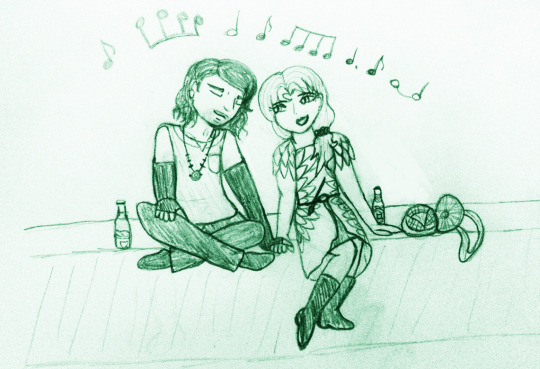
(Sorry, I couldn’t resist starting with a recycled doodle of my canon ship, the HMS Carion. 🥰)
Andre Egwu
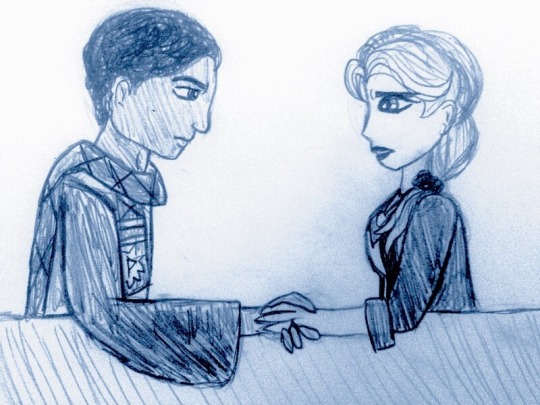
Alright, right off the bat, we should discuss Carewyn’s canon ex, Andre. Carewyn and Andre attended the Celestial Ball and dated until their fifth year, breaking up right after the All-Wizard tournament. Fortunately despite their break-up, they’ve stayed on good terms and still greatly respect each other -- but truthfully, I never intended for them to be a long-term match in any universe. If you’d like to read more about why Carewyn/Andre didn’t work out, you can consult this analysis, but to put it very simply, Andre was someone Carewyn admired deeply, but couldn’t ever be completely herself around. And from a personal perspective, my parents are one of those rare couples who remained friends even after divorcing, and I’ve always found their relationship really fascinating, as no one can deny they do still sincerely love and admire each other, even if it’s no longer romantically. Carewyn and Andre know each other in a way no one else does, so it gives their friendship a depth that it didn’t have before -- so unlike with a lot of relationships, their bond actually strengthened after they broke up, rather than falling apart.
Bill Weasley
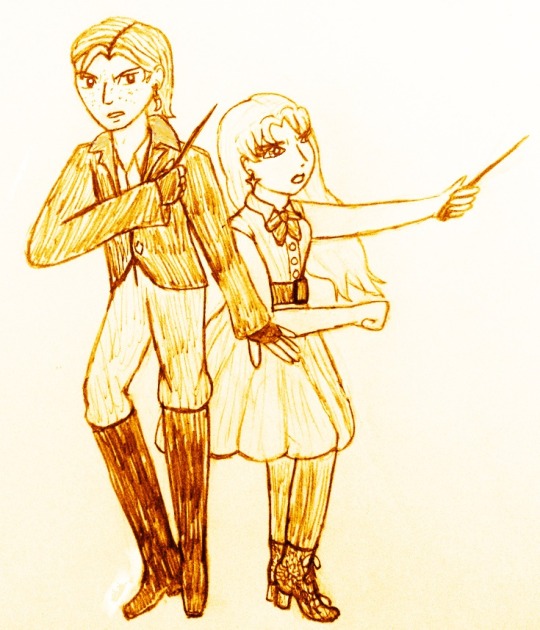
In Carewyn’s canon, Bill ends up becoming Carewyn’s best friend. Although at the start, their relationship had much more of a surrogate big brother/little sister dynamic, over time the two ended up on much more equal terms, both as Cursebreaker partners and as unofficial “parents” for the rest of their friend group. Bill is Carewyn’s right-hand man both while dealing with the Cursed Vaults and while leading the Circle of Khanna, and even though Carewyn wants nothing to do with Cursebreaking after dealing with the Vaults, she’ll still drop everything to help Bill with his work, should he need her. Bill is the one who came up with the nickname “Carey” for Carewyn, and he’s also arguably the friend who understands Carewyn best after the death of Rowan, given the similarities in their personalities and how long they’ve known each other. I actually did write out a post guessing what a romantic relationship between these two might’ve been like if they’d become a thing, but honestly, I’ve never really shipped these two. Carewyn may not be entirely based on me (she’s got elements of my mum too), but one aspect of the wish fulfilment for me early on was that my girl could have a ride-or-die best friend like Ron was for Harry in the original Potter books. In the end, that friend ended up being Bill, Ron’s eldest brother and a character I loved when I first read the books and only became fonder of through the game. And honestly, we could really use more sincerely loving, but completely platonic male-female friendships that never bump up against romance!!
Talbott Winger
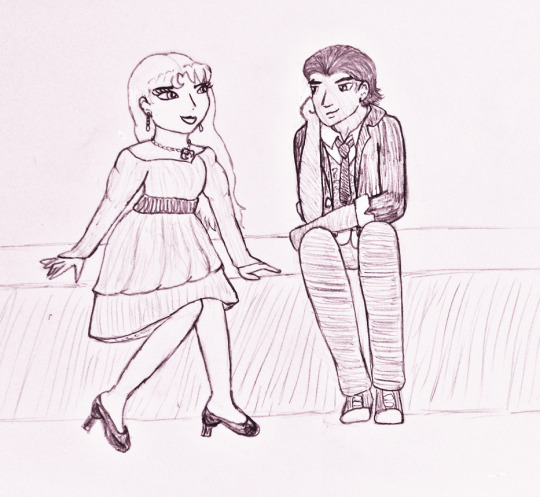
Talbott and Carewyn are truly “birds of a feather,” though one would never know it based on their respective masks. Talbott is the sort to put a gruff facade on to hide his more sensitive feelings, while Carewyn is the sort to put on a pretty face to hide her angrier and sadder feelings. Underneath, though, they both are stubborn, intelligent, and distrustful people with a strong desire to fight evil and a creative spirit. After becoming an Animagus, Carewyn would frequently fly around the school grounds with Talbott in robin form, singing songs for both herself and Talbott, and even though Talbott teased her about it, he did sincerely enjoy it. Carewyn loves reading Talbott’s poetry, and Talbott is also one of the few people who can get Carewyn to laugh a lot, since their senses of humor line up really well. Last but not least, they become a lawyer and an Auror post-Hogwarts, so they end up working together A LOT, especially post-War. I did write a prompt once about what a Talbott/Carewyn romance would be like, and I admit, I could see them being a relatively good couple, particularly since I headcanon both of them as being on the ace spectrum. That being said, though, I ultimately didn’t go with Talbott for Carewyn for two reasons. One, I thought they’d be too similar in a lot of ways (most notably, they’re way too friggin’ serious -- give each of these two some sunshine, will you??) -- and two, on a much more superficial note, Talbott was so popular that I kind of hesitated before having Carewyn ask him out. (Plus come on, for that date, how much of a b*tch would you have to be to break Andre’s heart and then snatch up an outfit he made for you to wear on a date with his dormmate?! Just -- COME ON.)
Chiara Lobosca
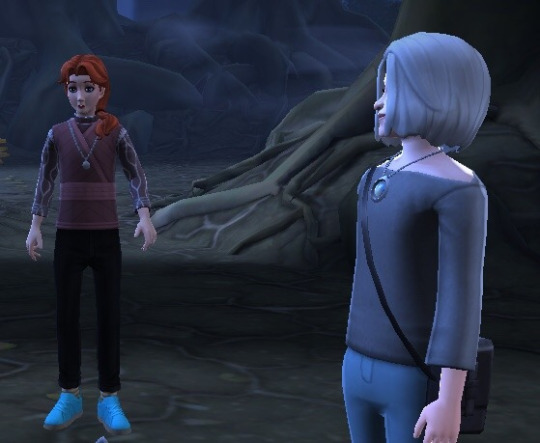
When I first started playing HPHM, I strongly considered shipping my girl with Chiara, once she broke up with Andre. From the moment Chiara and Carewyn met, Carewyn just knew she had to know Chiara better, and that ended up being because -- thanks to her latent Legilimency potential -- she could subconsciously sense that Chiara and she were similar in a lot of ways. Most importantly, Chiara was very lonely and desperately longed for a friend, which reminded Carewyn of how lonely her pre-Hogwarts life was, especially after Jacob disappeared. Once Carewyn earned Chiara’s trust, Carewyn proved herself to be a very loyal friend, even learning how to become a robin Animagus so she could keep Chiara company and cheer her up with twittered songs during full moons. Both Carewyn and Chiara are sensitive “Healer” type personalities (though Chiara is a bit more literal of one) who fight against their own crippling self-loathing to try to nurture others. This, in the end, though, is why I hesitated on making them official and why I’m ultimately glad I didn’t. Like Talbott, Chiara in some ways is too similar to Carewyn, and I think in a romantic relationship, they wouldn’t grow as much as people through their interactions. I did come up with quite a few ideas about what their relationship might be like -- but ultimately I couldn’t help but feel that Carewyn’s happy ending couldn’t just be about peace, but about finding someone who could challenge and contrast her.
Diego Caplan

This started off as a crack ship for me before actually gaining some legs and becoming Chiara/Carewyn’s main opponent, when it came to my debate with myself regarding Carewyn’s romantic future. In contrast to Chiara, Diego is pretty much Carewyn’s complete opposite. Carewyn is a planner. Diego is spontaneous. Carewyn is meticulous. Diego is flirtatious. Carewyn is serious. Diego is anything but. Carewyn is ace. Diego I headcanon as pan. And yet they both have their romantic and creative sides and are both seasoned fighters and loyal friends. Diego would definitely be able to bring some levity to Carewyn’s life, while Carewyn could bring some grounding to Diego’s. Diego even has a cute little nickname for Carewyn from their time in the Circle of Khanna: “general!” In short, these two would be perfect leads in a rom-com chick flick. But this, ultimately, ended up being why I hesitated on making them official and why I’m ultimately glad I didn’t. Diego/Carewyn is a ship that could really only bloom and blossom under fair conditions, and I had trouble seeing Diego being equipped to deal with Carewyn’s darker emotions or even her more intellectual bent. Just like with Chiara, I came up with plenty of ideas about how these two could be as a couple -- but I really felt as though Carewyn needed more than just “fun” as a happy ending. And ultimately, this conflict between peace VS fun ended up coming to an end when I discovered Carewyn/Orion, as Orion could provide Carewyn with both.
Jae Kim
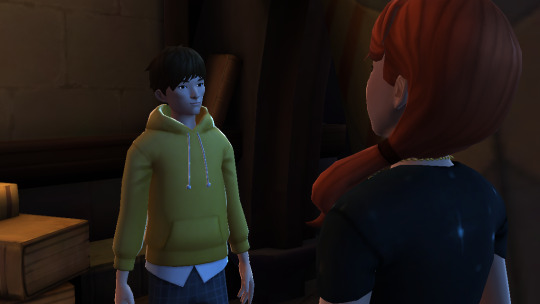
Okay, honestly? When I first encountered Jae as a character, I didn’t think he and Carewyn would have anything in common, but in a weird way, they sort of subvert their respective house’s stereotype by exhibiting values from the other’s house! Gryffindors are seen as these rash, reckless, show-off hero types, but Jae showcases a lot of Slytherin-worthy cleverness, resourcefulness, and disregard for rules and what others think of him. Slytherins are seen as these cold, cruel, ambitious villain types, but Carewyn showcases a lot of Gryffindor-worthy courage, nobility, and selflessness. And so even though Jae is generally a rulebreaker and Carewyn is generally a rule-follower, when circumstances made it ideal for them to be on good business terms (namely, working in detention together and Carewyn needing an ally who knows Knockturn Alley and Jae needed an ally who was a Prefect), they soon found a lot of common ground. Add to that how much Carewyn encourages Jae’s cooking talent while respecting his privacy, and it’s little wonder that post-Hogwarts, when Jae opens up his own pub on the border of Diagon Alley and Knockturn Alley, the two still meet up very frequently to swap news from their respective corners of the world. I admittedly don’t know how well Carewyn’s job as a magical lawyer would be conducive to her being anything other than friends with Jae, and I don’t think they’d ultimately have many interests in common, so I do much prefer them as friends, but their dynamic is full of fun contrasts!
Ben Copper
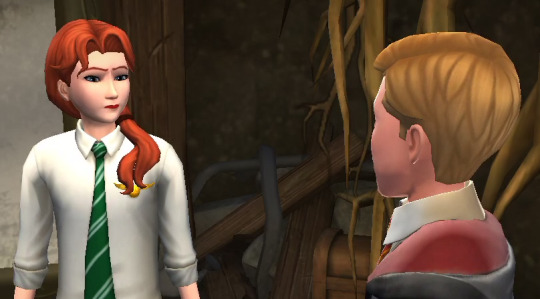
Hahaha, oh god. So. Obviously Ben in-game is still very polarizing, but in my canon, Ben and Carewyn’s relationship is really complex and honestly one of my absolute favorite friendships for my girl. Ben was one of Carewyn’s very first friends, so he -- like Rowan, Bill, and Penny -- knows Carewyn in a way few others do. He befriended her before she became known as the poised, perfect Slytherin “Mama Bear,” but unlike her other friends, he was a bit disappointed by her abrupt transformation between her third and fourth years. While those like Bill, Penny, and Andre saw it as Carewyn coming into her own, Ben noticed how much Carewyn put herself “over” the rest of her friends, becoming their protector more than their equal, and Ben lamented it, disliking how he felt like a responsibility to Carewyn more than her friend. But Ben kept those feelings inside, not knowing how to properly express them when he did still cherish Carewyn’s friendship. After the events in the Portrait Vault, Ben went through his own dramatic change, and Carewyn sure enough didn’t end up liking it any better than Ben had liked hers. But ultimately the two had a heart-to-heart and realized that they both had become very different people than the kids who’d befriended each other in first year. After Rowan’s death and the formation of the Circle of Khanna, the two reforged their friendship on more equal terms. I did actually write out an AU roleplay where Ben and Carewyn’s confrontation in Jacob’s room ended up hinting Ben/Carewyn, but I ultimately think that the people they ultimately become are way too different to be a great romantic match. It makes their friendship fascinating, as it makes you wonder how such a tall, suspicious, reckless Gryffindor ever befriended such a poised, methodical, lady-like Slytherin...but even if they do feel a lot of deep platonic love for each other and I personally headcanon Ben being on the ace spectrum like Carewyn, I ultimately think they’d have very different dreams in mind for their future and would each need something different in a romantic partner.
Barnaby Lee
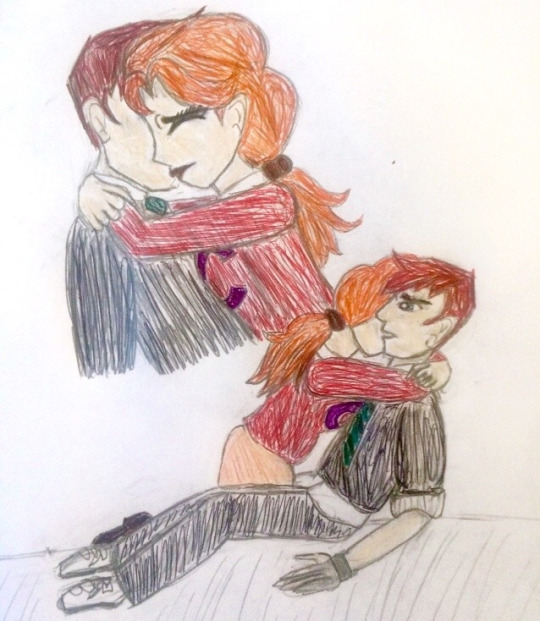
Barnababy!! 💚 Yeah, Barnaby Lee is my personal favorite HPHM character, and yet I have never really shipped him seriously with Carewyn, even though I love their relationship and could see potential chemistry. Barnaby and Carewyn are both amazingly sensitive, loyal, and modest Slytherins with a love of magical creatures and a strong sense of honor, but they also contrast each other in some fun ways too. Carewyn may put on a happy face a lot, but she’s actually rather pessimistic. Barnaby’s unblinkingly optimistic and he wouldn’t even dream of putting on a mask to hide his feelings. Then of course there’s the fact that Carey-Bear is this tiny and rather physically weak thing, while Barnaby is a perfectly dashing tank. 😂 Barnaby and Carewyn are both protective of each other, as seen by Barnaby throwing himself in front of Carewyn to shield her from an Imperiused Rowan’s spell and Carewyn verbally tearing into Ismelda when she learned she planned to use a Love Potion on him. Barnaby was the one who really taught Carewyn about how deceiving appearances can be, and Carewyn was the one who really taught Barnaby about how generous and selfless friendship could be, so they both respect each other a lot. For all that respect, though, there’s a significant slant to their relationship. Carewyn supports Barnaby emotionally infinitely more than she would ever let him support her, so their dynamic comes across as very “mother/son”-like rather than complete equals. Plus, honestly, I think Barnaby and Carewyn’s dreams for their respective futures -- namely, to be a magizoologist traveling the world and to be a magical lawyer for the Ministry of Magic -- don’t match up in the least bit. I could also see Barnaby wanting a large family, and Carewyn has no interest in bearing children herself and would prefer a quieter home life.
#hphm#hogwarts mystery#analysis#au#shipping#carewyn cromwell#andre egwu#bill weasley#talbott winger#chiara lobosca#diego caplan#jae kim#ben copper#barnaby lee#...geez carey's pan and yet so many of her potential love interests are dudes XDDD#I blame the fact that among the hphm cast most of her closest friends are dudes#though of course she's got plenty of mc friends who are chicks#but yeah I headcanon carey as ace/pan so she's attracted to personality more than gender#of course in the end she got orion and you all know I'm happy about that XD#hphm au ships challenge
30 notes
·
View notes
Text

introduction: a comprehensive guide of anything and everything relating to spending the night with leroy jethro gibbs. i’ve been writing and headcanoning gibbs for about four years now, so i’m basically an expert. so i’ll impart my wisdom upon all you gibbs fuckers out there. half-headcanon, half-character breakdown on how gibbs breaks your back.
table of contents
rule 9 - never assume (smashing stereotypes)
rule 1.2 - never screw over your partner (courtship)
rule 20 - always look under (this is his rifle)
rule 23 - never mess with a marine’s coffee (what he likes)
rule 38 - your case, your lead (doing the do)
rule 45 - clean up the mess that you make (or: aftercare)
conclusion
rule 9 - never assume (smashing stereotypes)
jethro is dispassionate. imagine thinking this man wouldn’t throw all of himself into his lover. couldn’t be me. just because he has walls and he’s careful about not opening up doesn’t mean the sex will be any less passionate. it is all or nothing for him.
he’s vanilla. sure, jethro may have some old-fashioned, vanilla tendencies. but i would describe him as a neapolitan ice cream: there’s some vanilla, but other flavors are there and it’s really dealer’s choice. jethro will likely change his tactics depending on if his lover needs some more rough, or sweet, or something that will take away their power.
there’s little to no aftercare. the harsh and distant federal agent that jethro portrays during the day does not translate into his sex life. he loves the people he’s close to, even if it’s difficult to show. but after sex, when the world is still so far away, jethro finds it the easiest to lean into his more vulnerable side. kiss and touch his lover without the fear of seeming weak. he wants to be able to take care of his lover, in all avenues of life.
he always need to be in charge. i won’t sit here and tell you that jethro finds no pleasure in taking on a more dominate role. but it would be a lie to say he doesn’t find it extremely fucking sexy when you take control and give him orders. tell him to strip down or order him to make you cum.
rule 1.2 - never screw over your partner (courtship)
jethro is, no surprise, a hard man to get close to. difficult, but not impossible. you should approach him as an equal and don’t let him play his bullshit games.
it’ll take time and effort to earn his trust. usually, gibbs can get annoyed by people overstepping their bounds with him. trying to push too hard to get him to open up when he isn’t ready. don’t go to him in hopes of somehow getting him to let his walls down. he’ll come to you when he’s ready.
gibbs responds best to lowkey, non-verbal acts of affection. bring him coffee when he’s low, share your lunch, take the annoying phone calls for him. he’ll notice the little things, and he’ll reciprocate. he’s most comfortable with non-showy affection.
be honest. be trust-worthy. don’t lie to gibbs (if you can help it.)
and don’t get frustrated if he seems to be reluctant to crossing certain lines. jethro’s moral code is very important to him, and he’s learned not to get that close with people if it’ll be complicated. so show him that those lines he’s so afraid of crossing aren’t so bad. show him that he can love people without it jeopardizing everything.
slowly, carefully, start flirting. once you’re comfortable with each other and there’s a mutual trust going on, gibbs will definitely respond to some flirting. at first, it’ll be playful. trying to fluster you because it amuses him. but over time, his jabs will become compliments. going from “you’re all dressed up, you got a date tonight?” to “you look nice.” very subtle shift, but very meaningful.
start getting touchy. try to insert yourself into his bubble. gibbs will need that extra push, and if you’re holding his arm or hugging him or putting a hand on his shoulder, that just gets him used to your touches.
eventually, jethro will realize that you somehow wriggled your way past his walls because you leave his house after having dinner together and he wishes you’d stay.
rule 20 - always look under (this is his rifle)
this part of the guide details key parts of leroy jethro gibbs’ body. sensitive areas, discussions of cock, and reactions to certain stimuli.
sensitive areas:
surprisingly, his hands can be very receptive to touch. he’s rough and a fighter and he builds boats, but touch his hands and he’s putty. this also includes taking his hands and leading them to where you want them to touch you.
squeeze, bite, and scratch his shoulders while fucking. jethro’s got some broad shoulders, and he does love the feeling of you digging your nails into his skin when he goes a little harder.
stroke his belly and chest while giving blowjobs. he’ll get goosebumps and it will drive his touch-starved nerves crazy.
touch his face while riding him. curve your hand around his jaw. go up into his hair. gibbs has a big thing about face touching
the marine’s load out
jethro’s cock is average in length, but his real bragging rights come from the girth. he’s thicker than usual, and he’s sure to fill his lover up full. jethro knows this, and that’s the reason why he’ll be keen on foreplay or making you cum on his fingers first. he’ll probably brag just a little bit.
when hard, jethro is about 5-6 inches. thick and heavy with a lighter shade of red. he can get a bit veiny if you work hard enough - get him wound up enough to where gibbs is just throbbing in your hand. at that point, you should absolutely start pumping hard and quick. that’s when he’s at his most sensitive and there’s a big potential for jethro to get fairly loud.
the volume of his pre-cum is kind of a random thing. sometimes there’s a lot, other times he’s pretty dry. don’t be afraid to use your own spit for a handjob, or go down on your knees to get him in your mouth. besides, gibbs likes it just a little bit messy.
when leroy jethro gibbs cums, there’s almost always a guaranteed chance of semen. like many avenues of his life, he will completely blow away your expectations. even if you make him cum several times throughout the day, he’s unlikely to start shooting blanks. jethro will give you a reward for all your hard work by cumming in your hand or mouth every single time. though, knowing him, this shouldn’t surprise anyone.
rule 23 - never mess with a marine’s coffee (what he likes)
jethro gibbs likes to add a bit of spice to the bedroom every once in a while. he knows exactly what he likes and doesn’t like, and he’ll be sure to tell you. but until then, here’s a quick and convenient list:
what he likes:
cumming on you
bondage
sub/dom dynamics
blindfolding
overstimulation
oral
lingerie
begging
barebacking
what he doesn’t like:
excessive dirty talk
pegging
clothed sex
use of toys
phone sex
roleplay / playing dress up
daddy kink
rule 38 - your case, your lead (doing the do)
with leroy jethro gibbs being sufficiently courted and now comfortable letting you in, it’s finally time to get down and dirty with him. after dinner and a couple glasses of bourbon (jethro’s way of wooing his lovers), he’s ready to take things to the bedroom. what now? follow these guidelines to ensure the best fucking this marine can offer:
jethro will automatically go into “take control” mode. he’ll be kissing you, touching you, keeping you distracted with his mouth and before you know it, his coat is on the floor and his hands are coming up the back of your shirt. don’t let him go it alone - touch him back. tug on his clothes. make him know you want him.
you should be the one to undress yourself, if you can help it. he would like to watch you slip your shirt off or shimmy out of your pants. you might feel a bit self-conscious under his gaze, but trust me. you’d be able to tell if gibbs didn’t like what he saw.
a big tip to fucking leroy jethro gibbs is to catch him off guard, sometimes. not everything has to be a surprise, but if he’s busy trying to suck a hickey into your neck, maybe palm him through his pants. or tug on his hair a little.
it’ll give him a bit of a rush, but jethro would also appreciate that you’re eager to give as well as receive. he’s had his share of selfish lovers in the past, so if you convey that you want to pleasure him as well? you’ll have him wrapped around your finger.
he’s good with his hands. he loves working with his hands. gibbs is almost too eager to push his fingers inside you and make you rock up against his palm. don’t be afraid to pull his cock out of his pants and start working him up, too. it’ll be almost too easy to have him grunting between clenched teeth. trying to focus on fucking you with his fingers but the glide of your hand is too good to concentrate.
but rest assured, jethro won’t stop until you cum on his fingers, at least once. he’ll have half a mind to make you cum once more, just because he can. he may not admit it (he’s not all that great at dirty talk) but gibbs loves hearing you cry out his name. loves your little moans when you’re getting closer. it’s almost enough to make him forget how hard he’s throbbing.
once he’s sure you’ve orgasmed an acceptable amount, jethro would be ready for the main event. usually, his go-to position is missionary. he’s old-fashioned, like that. it’s where he works the best. he’ll kiss you, let his hands wander and explore for a bit before penetrating. jethro is slow, at first. steady, but slow. he’ll want to work up his own rhythm, even if you’re begging for him to go a bit faster.
he relies more on power and strength than the speed of his thrusts, anyway. you probably will find it difficult to walk right the next day.
as he gets closer to climaxing, you’ll really start to notice. gibbs has this thing where he wants to get as close as possible when he’s cumming. when he’s close, just cling to him. touch him. wrap your legs around his waist and let him ride it out while grinding up against your body. and keep him close, even after jethro slows to a stop.
rule 45 - clean up the mess that you make (or: aftercare)
jethro gibbs will rely on a bit of aftercare, even if he doesn’t think so. he’ll be more than happy to offer it - he’s not the type to simply turn over and fall asleep without tending to his lover. but here are some ways to return the aftercare:
dozing together: curl up to gibbs, close your eyes, and just relax. he doesn’t need words or pillow talk; jethro probably would feel more at ease in comfortable silence. he prefers laying with his lover and simply enjoying the feeling that comes after a good fuck.
petting: stroke his hair. play with his hands. something soft and physical to help ground him. jethro doesn't hate physical contact - he’s just kinda touch starved. letting your fingers stroke over the skin of his chest really does wonders.
drinking bourbon: old habits die hard? this may be on a more rare occurrence, but gibbs would definitely appreciate a finger of bourbon. mostly after a quickie, but sharing a glass with him would surely good for his emotional well-being.
conclusion
this has been a quick, easy-to-digust guide on fucking leroy jethro gibbs. i’m glad you stuck with me through this analysis, and i do hope this helps you with any future fucking you may find yourself in. take this knowledge and do some good with it.
223 notes
·
View notes
Text
a deep dive into the home life of bern’s royal family, and why zephiel became the man he does when he grows up. whilst some headcanons are made here, it’s mostly just me extrapolating what we already know in canon.
tw: emotional abuse and toxic parenting under the cut.
king desmond and queen hellene were wed out of an entirely political marriage, and although hellene was excited at the prospect of having the opportunity to be a good wife and mother, she would never have the chance to truly be seen as the former due to the fact that desmond harbored affections for his actual paramour, a bernese woman of common birth. he would never be able to marry the love of his life due to both status reasons as well as how bern sought out the advantages of linking themselves with one of etruria’s most noble families, thus giving them a link to another major power in the continent. it would be foolish, in the bernese court’s eyes, to refuse the marriage offer from hellene’s family then.
though he could not officially be with his paramour, king desmond was allowed to host her within the bernese royal palace, and so he did, making quite public displays of affection with her while electing to not spend more time with his wife than necessary. it was quite obvious who he favored of the two, and desmond was never really a subtle man who kept his emotions close to his chest. servants could describe his behavior towards his lover as amorous to the point of being sickeningly sweet and his behavior towards his wife were dismissive at best, outright hateful at its worst.
desmond’s nasty nature against his wife is what leads hellene’s own dreams to turn away from that of love to one of power. when she bears desmond’s heir in the form of zephiel, she immediately expresses hope for the day that zephiel will take the throne away from desmond. being the mother of the future king, she assumes she will be given more respect around the palace and have a more secure future. zephiel is seen less as her beloved son and more as her winning piece to get back at desmond; zephiel is the constant reminder that desmond’s days in power are limited, and that one day it will be hellene’s own blood taking over.
desmond, upon first seeing zephiel, hates him for the mere fact he is hellene’s son. zephiel is living proof of their a marriage forced onto him, and he cannot stand the living reminder of it, especially if people were going to come and congratulate him on the birth of a healthy heir and then speak about the son frequently now. to avoid the nuisance of being forced to see his newborn child, he banishes both zephiel and hellene to an off-site manse under the guise of claiming that hellene needs more time to be able to relax with the baby. this further enrages hellene, motivating her to make zephiel into a project to spite desmond.
she will make it so desmond must acknowledge their son.
hellene from a young age is both strict and neglectful with her son. zephiel is afforded every tutor he can be given with her own personal funds ( funds that desmond is obligated to give her every month but no more ) and is sent to lessons as soon as he can walk and talk. he is drilled in military arts, history, etiquette, the arts, and all manner of topics to groom him into the perfect heir. luckily for her, zephiel proves to be a prodigy and excels in everything quickly. she spreads this like wildfire, telling every and anyone of how perfect her son is so as to make the general populace enamored with him.
the lessons zephiel devotes himself to is scheduled in such a way as to not afford him much free time if any at all, and when he is given the chance to breathe, he is encouraged to spend it on pursuits that will make him look either handsome or intelligent such as learning to play an instrument or falconry. when he gets the chance to speak with his mother, usually only at meal times, she is quick to ask him of his studies and nothing else before excusing herself. if things are going well, she praises him and finds new topics and limits to push onto him. if things are going poorly, she goes to discuss things with his tutors.
zephiel does not know love, but if he does not know it, then he cannot be sad to be missing it.
these days of aiming to become the perfect heir continue, and when he is old enough, hellene tries to show him off to desmond. hellene waits until she is positive that zephiel is in top form, and she stresses upon zephiel to make sure he impresses his father.
he performs spectacularly. he is polite, he is well-learned, and he endears the knights with both his charisma as well as his talent in martial arts despite his young age.
the sight of everyone surrounding desmond, people devoted to him, being taken by the prince enrages him. hellene’s smug smirk in the corner does no favors either. desmond realizes that the people love the person he has resolved to hate, and he looks bad for not welcoming zephiel into the palace as a result.
stubborn to a fault and envious over how his son is better than him in every degree, especially given how desmond himself is a mediocre man, desmond takes to publicly shaming zephiel. desmond is unable to quell his own ire in order to remain civil, and so he sharpens his words in order to try and chase the boy away. the less time zephiel spends in the palace, the less he can charm the people around him.
desmond also goes on the offensive, calling out zephiel’s behaviors as manipulative. he tries to warp the narrative, claiming zephiel’s attempts to get in his father’s good graces are in actuality calculated moves to make him look bad in contrast, and that zephiel is merely a power-hungry prince who needs to learn respect. desmond is convinced this seemingly perfect son of his is just like the woman who conceived him, and he cannot see zephiel as anything other than someone who plots against him and wishes to see his downfall.
zephiel, confused and distraught by this callousness, struggles to cope with it. his mother and the tutors ensure he is wonderful, but his father openly bashes his character and disapproves of him so vehemently. though hellene is upset by this turn of events, she insists that zephiel continue his studies and attempts to make desmond recognize him as his rightful son.
being treated to verbal abuse every time he visits the palace but encouraged to desire approval from his father, zephiel’s brain attempts to make the reality easier to stomach by twisting his perception of his father’s words as right. if he is to keep trying to curry favor with his father, then it would be difficult to do so while believing he is being unreasonable.
every time desmond scolds him and tells him that he is not worthy of his love nor his position as crown prince, zephiel begins to believe it more and more. the problem lies with him, and he must earn his father’s love. the burden lies on him. he begins to pray to st. elimine every day for this, but his prayers go unanswered as the abuse remains the same.
if even st. elimine won’t help him, then this is proof that zephiel is simply not working hard enough and is not deserving of such a gift as familial love. st. elimine isn’t wrong to not grant his wishes. st. elimine is a beloved religious icon.
the desire for love grows as does the mistreatment when zephiel meets desmond’s second child. she is a little girl named guinivere, born from desmond’s mistress. though desmond attempted to keep guinivere and zephiel from ever properly meeting, guinivere is a bit of a rebellious girl in her youth and desmond is helpless to stop her, too doting and weak to her as the product of his healthier romance.
guinivere instantly loves zephiel, and she begins asking every day to see him again and play with him. she is open with her adoration, and this is the first time zephiel experiences actual love from anyone. he, in turn, loves her too in the purest way a half-brother can, starved for genuine affection all his life, and the two prove difficult to separate.
desmond grows paranoid that zephiel aims to kill guinivere to try and get him where his greatest weakness lies, still convinced that zephiel is as conniving and out to get him as hellene is. desmond grows physically violent now, destroying and killing any gifts that zephiel brings with him as he is unable to physically harm zephiel himself without being criticized even more by the royal court of bern. he shuts zephiel down even more each conversation they have, and his vitriol is even worse than before.
desmond hates his son for not only being the perfect heir but also for being the person guinivere loves the most in the world, even moreso than her own father.
zephiel is given even less leave to be able to visit the royal palace now, giving him more time to reflect upon his perceived mistakes in conduct and more time to prepare for the next time he shall meet his father only to not even be given a chance to impress the man. the more effort he puts in, the more he despairs at the inevitable failures. the more love he receives from guinivere, the more he wishes he could be with her always, and the more he longs for similar affection from his father and mother.
he yearns for a loving, happy family. he tells himself he has not earned the right to have it.
this self loathing and lack of confidence in himself rises to such a point that zephiel refuses to believe other people when they compliment him. he sees praise as ultimately unhelpful to his quest to get his father to approve of him, and he convinces himself that his father’s insults and critiques of his character are his father’s way of trying to groom into someone worthy of his attention. the only correct person, the only person worth listening to, is desmond.
his belief in his father is unshakeable. even when his father hires assassins to get rid of him on the eve of his coming-of-age ceremony, zephiel does not suspect for even a second that it was him who had sent the hitmen in the first place. zephiel merely sees the incident as the universe testing him, seeing whether or not he can weather through what might come for him one day as a royal. it is merely expected of him to be able to fend off such attempts, and anyone could be out to get him.
when his mother goes through an unexpected shift in demeanor after the incident, even telling him that she will try and support his wishes to move back into the palace and live as a family, he believes he has taken a step forward towards his goals.
this would not be true, for desmond would merely wait for another opportunity to strike.
when zephiel grows to be of an age similar to when desmond himself became king, desmond invites zephiel to have a drink with him. zephiel is excited at the prospect; after over two decades of working for this outcome, it looks as if he has finally become a man worthy of love.
it turns out “love” tastes like poison.
for the next ten days, zephiel hangs on the cusp of life and death. he is unable to run away from the truth this time: his father wished to kill him. it was his father who knowingly served him poison, and it was his father who smiled as he was writhing in pain after taking a sip from the goblet. it was no ordinary poison either, but rather a poison meant to incur agony upon its victim as they remained aware of it for more than a week.
desmond wanted him to not only die, but to be suffering a slow death too.
zephiel is only able to survive the incident due to his vassal murdock’s dutiful attempts to filter the poison out of his system, but when zephiel is able to regain his strength, he is completely changed by the experience.
his previous unshakeable faith in his father being the type of man who is secretly looking out for zephiel and trying to make him the best man he could be is unable to cope with the damage and betrayal of trust displayed. the only way for zephiel to stay sane after the experience is to believe that it is human’s nature to be bad people. as zephiel ruminates during his recovery period, he looks back on all the years he had wasted trying to win the favor of a man who would never give it to him, and he evaluates the kind of man king desmond really is.
he looks at the envy, the open love for another other than his wife, and the paranoia. zephiel realizes desmond’s attempts to kill zephiel were all founded on ugly emotions, and in order to accept that the man he looked up to the most secretly had a dark heart, zephiel must then believe everyone can and will succumb to such emotions as well. after all, if desmond was supposed to be the best of them, then what could be said for people zephiel held in less regard?
he turns his personal tragedy into something he believes must be a universal one, and when he kills his own father a few days later, that marks the death of the zephiel who believed in the absolute good of people’s intentions.
it also marks the birth of a zephiel who believes the world would be better off without humans, for if they are all fated to become horrible people, then why bother with them at all?
#// is this the cleanest?? no. next question#// tldr zephiel refuses to accept that his dad is a bad person and assumes the blame for their failing bond instead ---#// -- when it gets to the point of no return he absolutely loses it. Oops#// hate the fact as i was writing this i was like 'dang this is easily the setup to like 500 manhwas i've read huh'#+. / hcs & metas.#long post ---#emotional abuse tw ---#toxic parenting tw ---
19 notes
·
View notes
Text
Is It Really THAT Bad?
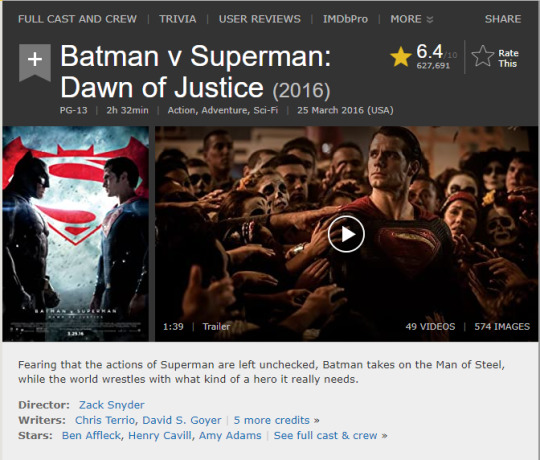
How many fucking times must I talk about this movie?
I feel like this movie doesn’t need an introduction. Everyone knows this film. Its reputation precedes it. It didn’t bomb and it’s not generally considered one of the worst films ever made (at least on the level of films like Robot Monster or The Cat in the Hat), but this movie is easily one of the most divisive films ever made. This film has generated enough arguments that, if we harnessed the energy of all the flame wars it has caused, we could probably power the entire world until the heat death of the universe.
With the impending release of Zach Snyder’s bloated redo of Justice League, I’ve decided to go back and ask myself of this film here… is it really that bad?
THE GOOD
Here comes the most uncontroversial opinion: the action scenes in this movie rock (or at least two of them do). The standouts are the titular showdown, which almost makes sitting through the rest of the movie worth it, and the epic warehouse fight Batman gets into, which is like something straight out of the Arkham games. It’s so good. And aside from that, a lot of the cinematography in the film is good. The film knows how to look good, though unfortunately it does end up being a lot of style with little substance.
youtube
On the subject of Batman, I think Ben Affleck is a great and inspired choice. I certainly think he’s worthy of standing alongside Batmans like Clooney and Keaton, easily embodying both the Dark Knight and Billionaire Playboy aspects fairly well, though the writing does not always handle him quite as well as it should (we’ll get to that soon enough). Henry Cavill, while still a rather dour Superman, is as good as ever as Superman, and Gal Gadot as Wonder Woman was a great choice here, especially since she didn’t have control so that she could insert anti-Arab racism, like some DCEU movies.
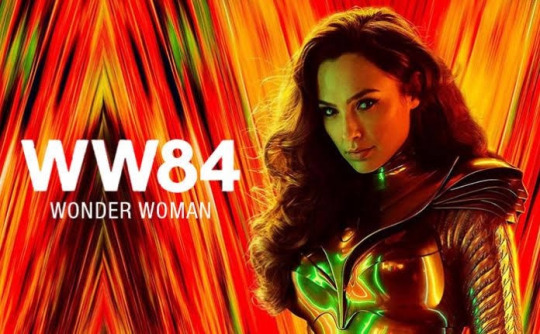
Perhaps one of the movies most impressive feats is how, in an uncharacteristic moment of brevity, it manages to condense the backstory of Batman into the prologue, getting it out of the way and not making us sit through yet another Batman origin film. This is literally the only thing the movie has over the MCU; where that franchise just has the character Spider-Man inexplicably in existence without even a hint of his origins, they just get Batman’s tragic backstory out of the way so we can see him beating the crap out of people. If more superhero movies want to take this route and just condense the backstory into an opening montage like this, I’d be down for it.
THE BAD
I really could just say “most of the movie” but that’s such a cop out. Let’s actually look at the problems. Let’s work our way up through the things from least problematic to most, shall we?
The best place to start is what Zach Snyder did to Jimmy Olsen.
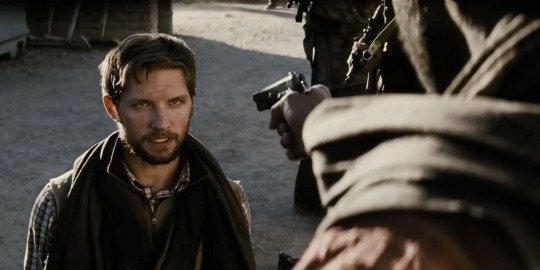
Jimmy Olsen is made into a CIA spook who is brutally killed early on, and yes, that was Jimmy Olsen. Snyder put him in to shock audiences with his senseless murder, and also because he felt the character had no place in his series. Does making Watchmen just turn people into joyless husks who like to horribly bastardize iconic characters? Jimmy Olsen is ultimately a small microcosm of the film, but he is the sum total of everything wring with the early DCEU. He is bleak, soulless, and shows a critical lack of understanding about the comics and why people enjoy them.
Now let’s move on to the more exciting problem to discuss: the villains. I don’t even think it’s worth wasting much time discussing what’s wrong with KGBeast. While it is kind of interesting they’d think to use the guy at all, the fact he never dons the costume and dies by the end of the film is unfathomably lame for a character named KGBeast.
Now, onto the main antagonist, and the most infamous part of the movie: Lex Luthor.
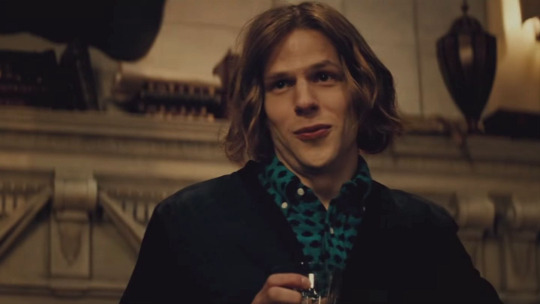
Lex Luthor is horribly, horribly miscast. Jesse Eisenberg is a great actor for sure, and he’s effective in movies like Now You See Me, The Social Network, and the Zombieland films. But here he is being asked to play one of the most diabolical cunning geniuses in comic book history, and rather than play him as such, he plays him like a cartoonish twit. This Lex is utterly unrecognizable as Superman’s greatest foe. Does anyone think Lex Luthor would send a jar of piss to someone as a joke before he blows them up? That’s more something the Joker would do on an off day. Lex is not cunning, not intimidating, and not diabolical in the slightest, and yet there are moments where Eisenberg’s acting chops shine through and Lex, for a moment, is almost engaging. Luthor really suffers the way Doctor Doom tends to in film adaptations: the filmmaker clearly doesn’t get why people like the villain, and decide to do some weird, unique take that will only cause to alienate fans.
But perhaps the worst of them all is Doomsday. Doomsday has exactly one claim to fame, and that’s killing Superman, so as soon as he shows up if you have even a passing awareness of the character you know how the movie is going to end, which robs the film of tension for its last battle. The fact he also appears with little buildup and doesn’t have any characterization doesn’t help; Doomsday is just the Big Gray CGI Blob that superhero movies try and pass off as a final boss for the heroes to fight. This has worked precisely once, in Iron Man. The Incredible Hulk and Venom did not make it work, and this film is nowhere close to being in the same ballpark as Venom.
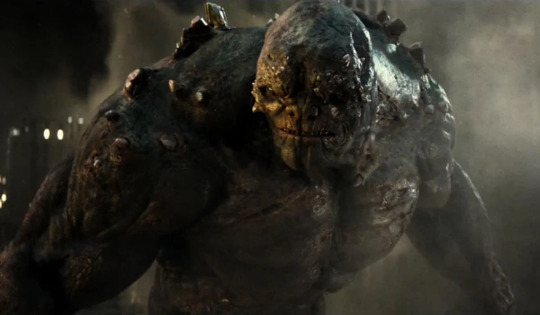
By and far the biggest problem, though, is the movie’s incredible length and its very existence in the franchise at this point in time. This is an epic superhero crossover in which two of the biggest comic book characters of all time fight and then team up… And it is the second movie in a franchise. While they do a good job of establishing Batman rather quickly, Wonder Woman comes out of nowhere. And then at the end, Superman ‘dies.’ We have had one single movie prior to this to make a connection to the guy, and yet here he is getting a temporary comic book death with no buildup whatsoever that we know is going to be reversed sooner than later because the movie telegraphs this to us.
Imagine if, instead of building up the character over the course of a decade and putting him in all sorts of different stories, the MCU went right from Iron Man to Endgame. You go from a simpler, character-driven piece to a massive crossover where a hero dies right away, and it doesn’t give anyone time to care. Tony Stark had multiple films worth of characterization under his belt before they threw him in a crossover, let alone killed him, but Snyder expects you to give a damn about a Superman who just started his career in the previous movie of a franchise.
And the ass-numbing length of the movie is no justification. Even before the director’s cut came out this film was a slog, and the director’s cut really does nothing to earn its existence. All it does is add more runtime to an already tedious and bloated film, leading to the same exact ending and fixing none of the overarching narrative problems of the thing. The problem with any director’s cut is that ultimately the movie is still going to be Dawn of Justice, it’s still going to lead to extremely rushed character decisions, and it’s still going to be a mess. You’d have to redo half of the film to make this into a worthwhile and coherent narrative that’s actually worthy of being an entry in a superhero franchise.
And to top it all off, the movie spends far too much time foreshadowing for its own good. People criticized The Mummy for shoehorning in way too many shared universe elements right off the bat, and if that movie was bad for it, so is this one. The cameos from all the members of the Justice League, while striking, could be excised from the plot with little to no impact, and the Knightmare sequence is just excessive and weird.
youtube
Is It Really THAT Bad?
The answer to this question has never been harder.
On the one hand, this film does have some merit. There is some good casting choices, good cinematography, good action… But then, on the other hand, the film is overly long, pretentious, has poor writing and dialogue, mishandles everyone aside from Superman, and is just incredibly unpleasant.
This film is in many ways the exact problem Christopher Nolan created with his Dark Knight trilogy. Nolan, by grounding the fanciful characters of comic books into a realistic setting, created a climate in which someone could suck any sort of joy or meaning out of comics. The success of his films meant that people would see dark, gritty realism as preferable to joyous, colorful escapism, and the negative effects of his films, however good you find them, are still felt today even as filmmakers are finally shaking off the grit. Dawn of Justice is the zenith of Nolan’s style of superhero film. There is nothing fun, joyful, or engaging to be found here; it is simply the characters you know and love forced into dark, miserable scenarios that ends in death and misery. Where’s the fun? Where’s the color? Where’s the wonder, the excitement, where is any of it? This film paints a bleak and miserable and hopeless picture of a world of superheroes. It really makes me think of this rather famous comic panel:
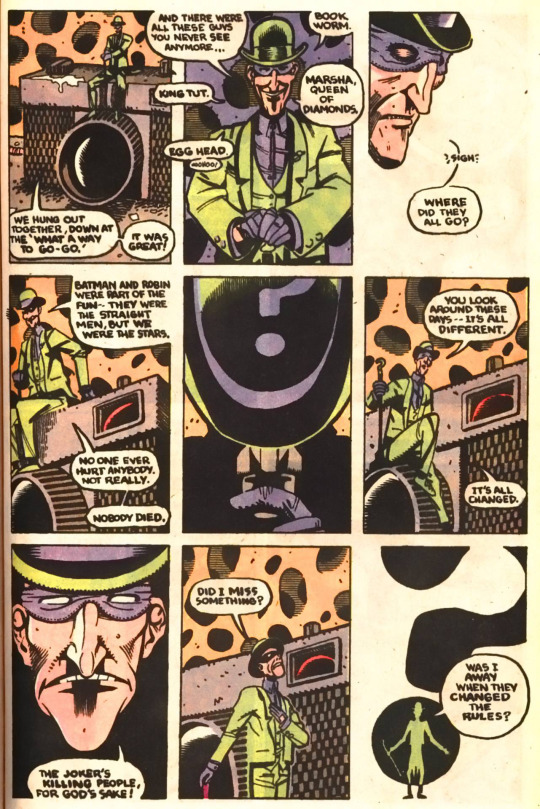
I absolutely hate this movie, but not because I think it’s bad. I hate it because it has enough good ideas where it should be the best thing ever, but it really isn’t. It’s a miserable slog of a film that does nothing to justify or earn its massive runtime whatsoever. It really does belong somewhere between 5 and 6 on IMDB, because I can almost see why people like it, but it just isn’t even remotely close to being how good its fan say it is. This is not a good superhero movie, and this is not how we should want superhero movies to be. There is a market for serious superhero fare of course, and there’s no reason that these films can’t engage with mature themes or anything, don’t get me wrong. But this is absolutely not the way to do it.
#Is it really that bad#IIRTB#Review#movie review#Batman v Superman#Dawn of Justice#Zach Snyder#Batman#Superman#DCEU
26 notes
·
View notes
Text
My Musings: Dominance/Submission

NOTE - This was originally posted and written from my Traveling Master Character. It didn’t really fit in well with my other TM stories, so I adapted it. These are my own musings after all.
*************************
My travels have afforded time to reflect on many erotic and incredible desires. For myself, I tend to crave the Dominance... The Control...
I get off on it.
To me, a sub is like a elegant instrument. A piece of art that needs a Dom to truly realize his or her potential. When a D/s relationship blooms under the right conditions, they make for the most wonderful and powerful symphonies. A Stradivarius will never produce a beautiful melody while being played by a mechanic trying to be a musician. And likewise, a world class musician could never create an opus with a monkey wrench.
Both are needed.
Along the way, I have discovered a simple truth that in my mind, has brought me to question what I really like about Dominance. This realization has even brought me to question if I am a true Dom. I’ve had this discussion many times and some understand it, and others simply do not. And after much thought, I believe that I am. Even if I seem to contradict myself.
A simple statement that is offend hidden deep inside all good Doms. Some realize it, others don’t...
But a good Dom will act according to this statement, even if he, or she, does not know he/she is. I’ve found many along my travels and discussions, most realize it, but don’t speak about it. Some fear what it truly means while others embrace it.
And of course, I see many Doms that simply don’t understand or care about my upcoming statement. They tend to find eager subs that embrace their rule and they live it out in marvelous and erotic ways. Are they bad?
Probably not.
I can certainly understand the rush and the allure of gaining dominance over a willing sub. To the point that it can even go to ones head. I can safely say that the fantasy of it has pushed me to write any number of stories. Especially in cases where special powers are involved. I mean... How would you react? Once you discovered you could manipulate the minds of anyone you meet?
Regardless... I digress...
Here is the statement:
A good Dom is in actuality, the one doing all the serving.
For a truly amazing and beautiful Dominance and Submission, a Dom MUST earn the right to dominate the sub. Although all Doms crave the control, the mastery and the pure bliss of having his or her needs taken care of by a good and obedient sub, I’ve come to believe in my heart that the true role of a Dom is to serve.
Yes... To serve... The Dom is there to give and support the sub that has decided to submit to his or her will.
A truly beautiful and wondrous thing...
There must be trust in the subs heart for her (or him) to truly give in and relinquish their will to another. That can only happen when she (or he) knows in their hearts that the Dom will give her (or he... Ok I’ll just continue with she from here) what she needs. What she craves. She ultimately decides what that is.
I can hear some of you that are saying that subs don’t always know what they need. And that is true. But what she NEEDS, is to discover it under your guidance. To blossom... To bloom under a Dom’s guiding hand.
In truth, being a good Dom is a lot of work. Of course, if done properly, the Dom gets what he is looking for as well. It becomes a symbiotic relationship where the lines of Domination and submission become crystal clear, while being completely blurred.
After all... In a healthy D/s relationship, the sub can always say her safe word... Tap out... Stop the dominance...
And as for Subs, you are not off the hook either. You have to make sure a Dom is truly worthy of your gift before throwing yourself at his mercy. Make no mistake, you hold all the power. It is your choice to give it to another. A sub that is too eager to give it up will not find true and complete submission. You also have responsibilities towards your Dom. Just as he will push you further and further. Step by step so can adapt, experience, and push through each demand or experience, so to must you burden your Dom with your submission. Step by step, giving up control and giving him the responsibilities no longer wish to have.
I see some relationships online that feel unhealthy. I speak with some followers that clearly don't understand this. I pity both Dom and Sub for not being able to move passed the superficial gain they get from this type of relationship. Especially since it can be so rewarding for both... In so many ways...
So please, cherish the exquisite gift you are given. You can’t force it.
You can only nurture it.
The Traveling Master
16 notes
·
View notes
Text
About the Mor-Azriel situation
So, I recently had a conversation with dear @herpowerisdeath about the relationship between Azriel and Mor and I decided to make my opinions on it into a post.
Now, this is a super difficult situation. I'll leave out the entire mess with Mor-Cassian-Nesta, because I already discussed it in this post. But as for Azriel and Mor, I think the general opinion in fandom is that Mor is to blame for the problems. But I think telling it this way is a bit too simple and actually does justice to neither character (and I love both of them).
First of all, I agree, it would have been the right thing for Mor to tell him that she's not interested, without revealing her sexuality of course. But still, I don't think it was as simple as "Mor could have just told him and it would have been fine".
1) I think for Mor, telling Azriel she's not interested and revealing her sexuality are connected. Sure, it isn't logical, but emotions rarely are.
2) I think if Mor were to tell him the truth without being able to give a reason, Azriel would probably see it as a sign of him being unworthy (more on that later). Mor likely knows that and wants to avoid it. (I know what she does doesn't actually make it better - worse, if anything - but she likely doesn't want to hurt him.)
Besides, I actually don't think it was ever Mor's intention to keep things going for centuries? Or to even let it escalate like that. It would make no sense at all. Here's how I think it went:
We know that Azriel told Mor he loved her when he found her in the Autumn Court/shortly after. You know, after her family had tortured her and left her for dead (nice timing, by the way). So afterwards, she was obviously not in the mental state to have a honest talk with him, telling him she's not interested (especially since she was terrified of revealing her sexuality to anyone). Then, there was the War and the matter with Andromache (her lover). Lots of trauma to deal with for everyone, includung Azriel, who likely had to do some horrible shit for the that-time High Lord. Again, not the time to have a talk. So Mor likely hoped that Azriel would see the signs of her not being interested and just move on. In 99.9% of the cases, I think that would have worked. It's the coward's way out, sure, but not that horrible. When did she realize it did not work? After one century? Two? At that point, Mor was already in a position where getting out again was incredibly difficult. But it was, I think, an accident. She thought things would go differently and then didn't want to lose her friends/ruin their family group.
And the way I read it, Mor wasn't leading him along. Not at all. It was always Azriel staring longingly and Mor avoiding him. She never reacted to him saying he loves her, which is a pretty clear sign. She slept with other males frequently. When he said he'd come along to Rita's, she very purposefully clung to Cassian. None of that is nice, or the right way to deal with it, but all these things are pretty clear. Also remember that Mor is extremely extroverted with EVERYONE - doesn't mean she's flirting.
Don't get me wrong, I think the entire Cassian-Mor-Azriel dynamic is incredibly unhealthy. But I think they are ALL to blame. It's not just Mor, it's every one of them.
And quite frankly, I find it a little disturbing that there are people saying it is Mor's fault that Azriel could never move on, that she broke him in some way. I mean, excuse me?
Pining after someone for 500 years is not healthy. Falling in love at 17 with a person who doesn't feel the same and never letting go is not normal. I'm not saying this to hate on Azriel (quite the contrary, actually, I love him). But to me, part of loving a character is realizing that they are flawed.
So no, I think that Azriel hasn't moved on isn't Mor's fault (although she certainly played her part). At the end of the day, it is Azriel's big flaw. It may not be as obvious because it harms/affects no one but himself, but it is the thing he'll have to overcome in the following books.
My personal opinion is that Azriel doesn't even really love Mor. He loves the idea of her - the bright, lovely, open female. But I think at this point, it's not really about her anymore. It's about worth.
We all know that Azriel has a low sense of self-worth. He thinks he's a bastard-born nobody, worth nothing. Mor (beautiful, high-born, extroverted) is the opposite. To him, earning her love would likely be the ultimate proof of his worthiness. And THAT is why he can't let go - he feels that he only needs to prove himself, he only needs to be good enough, and Mor will love him.
Mor telling him she's not interested (without giving the real reason) would not change that. Because it would not solve the underlying problem (and there has to be one for him to hang on for so long). Doing that is what Azriel will have to do himself.
Tags: @sjm-things
108 notes
·
View notes
Note
Sorry about the double ask so here's a fun idea, Emperor Belos wrote The Good Witch Azura books. Like he wrote them in his younger years before becoming a parasitic tyrant. - Pixel Anon
That seems like it’d be the perfect opportunity to segue into a lesson about Death of the Author, which- Given Sense and Insensitivity, and how this show already discusses how fiction affects reality and connects with it… Would be VERY refreshing to see, especially as a moral that I don’t really see other kids’ shows exploring! I do recall OK KO bringing it up with the Hero Cards not representing Kappas, but the more the merrier. It’d also be fitting to discuss Death of the Author, and separating a work from a terrible creator- Given the show’s frequent references to Harry Potter, which has a rather infamous author…
For neurodivergent kids who really get into hyperfixations and fandoms, which Luz and Amity basically are- It’d be fascinating to see them navigate this kind of twisted revelation! And it’d also force them to really re-examine The Good Witch Azura, because sometimes a work can’tbe separated from the harmful ideas of its creator, especially if it was made to transmit them… If Azura ever talks about dealing with ‘savages’, that’d be VERY sus and make matters a lot more complex. But then again, Azura also reconciles with Hecate, so it could be a matter of recognizing a work’s more problematic areas and criticizing them, while still enjoying it.
And, this makes sense, as The Owl House really does convey that experience of engaging with media and fiction, and how it relates to real life… And how media and fiction CAN mean a lot to people, it’s perfectly valid for one’s hyperfixations to mean the world to them! It’s treated as objectively terrible for Luz to throw away her Azura book, and bar a few social misunderstandings, the Azura books have otherwise brought nothing but happiness for her and Amity, and even functioned as something for them to bond over!
It’s perfectly okay for fiction to mean a lot to Luz, and she’s not being childish for wanting to hold on, to keep enjoying it- So it’d be an interesting discussion when Belos’ authorship is thrown into the mix, amidst potential problematic bits here or there. Then again, Luz is an ND-coded kid who continues to find solace in these stories, which would suggest that there isn’t anything there that would bother her- At least, nothing she’d have really noticed until someone pointed it out to her.
Then there’s the appropriateness, of Belos’ own fantasy being what could’ve led to Luz being deluded in her own right, projecting fantasies and dreams onto reality, wanting to be a chosen one… It’d be an extension of the kind of harmful delusions and ideas he puts into others, tying it back all the way of Luz herself, prior to arriving on the Boiling Isles! It’d give us insight to Belos as someone who really gets people to believe in the idea of being special, of being chosen, specifically for the Emperor’s Coven… And how this could relate to HIS character, if he himself is also a victim of these kinds of issues. If Belos is Luz, in that she never learned to differentiate fantasy from reality, and felt entitled towards bringing her stories to life.
Perhaps Belos isn’t REALLY chosen by the Titan, he just likes to think of himself as a Chosen One- Or he was, but others can also quality for this honor, which is something that aggravates Belos because it alludes to him not being more special than others. Because to Belos, it’s not enough to be unique and valid in your own way; You must be actively better than others, and the creation of the Emperor’s Coven above all reflects this. The belief that magic is a privilege, a luxury, something you must actively earn or be more worthy of than others for…
It’s also an interesting contrast, as if Belos has also been influenced by his works, or his works are a reflection of that- Then it’d set him apart from Luz as someone who actively deludes himself. As someone who is voluntarily blind, and willfully ignorant- Just like Lilith, who was inspired by Belos and looked to him as a role model when she was younger. Even before becoming a parasitic tyrant, Belos was a dark reflection of Luz, subjecting others to fantasies and delusions… Maybe not initially maliciously nor willingly, maybe it was just him having fun like any author. But then this innocuous action became very dark in retrospect, as Belos and his ‘hobbies’ worsened and took on a more harmful role for the people of the Boiling Isles.
I suppose it’s worth noting that Belos’ imagery invokes a lot of white, which is also seen with Azura’s predominantly white-and-purple robes… While Belos is white-and-gold. If Belos is a dark deconstruction of Luz’s assumption of a Chosen One narrative and fantasies, then maybe he’s also a deconstruction of Azura herself; And this of course suggests that he actively emulated his own creation. He’s artistic and a writer like Luz is, but it seems Belos got TOO convinced by how good he was, and couldn’t take constructive criticism- Which could be like King as an author in Sense and Insensitivity, up until he realizes that Luz’s input helped make him so great!
Luz and Amity can still engage in fantasy and fiction, the show always lets them find joy in this… It’s just a matter of finding the distinction between the two and recognizing it. Fully indulging into fantasy is what could’ve led Luz to accepting Adegast’s illusions… But entirely rejecting is is the path that is the Reality Camp, which would’ve sucked the fun and joy out of Luz and turned her into a hollow, soulless imitation of herself. It’s okay to find comfort and media and even be inspired by it, to even take lessons from it; And while you should always prioritize listening to real life when it says otherwise, I think it’s worth observing that Luz’s quest to be a good person like Azura… Well, influences her to be kind!
And it’s this desire to emulate Azura that influences Luz to learn magic, which creates yet another hyperfixation that brings the girl joy, and leads to her connecting with Eda and everyone else in the Boiling Isles in the first place by staying there! Perhaps Belos will contrast with Luz in that while he recognized media’s ability to make him feel happier, he ultimately used it as a crutch, a substitute for actual meaningful interaction and connection with other people- Thus creating the monster we see today. There could be the idea of finding role models, people you want to emulate- But also recognizing their flaws, where to criticize them, and not be like them. That could tie into how Eda is a teacher to Luz, but isn’t always right and excels by taking Luz’s feedback into consideration, instead of assuming she always knows better and will never be wrong.
All in all, this is a fascinating idea Pixel Anon! Even if Belos has no literal connection to the Azura books, I am a big fan of the idea of him being a dark reflection to Luz… A Luz as we see her start out in the series, only to be a Luz who never learns the lessons we see her go through. Belos wanted to be a hero, a main character; But he never went through the actual arc and character development of one, and instead ended up as the static villain, the main antagonist who causes problems for actualheroes. If some characters become what they despise most by trying to avoid that, then perhaps Belos is someone who avoids becoming what he wanted to be, in his attempts to be like that.
Whether or not media has played a role in Belos’ life has yet to be seen, but there is the idea of him having lived out a traditional ‘fantasy’ without realizing it as such, because to him this IS his reality- So it’s ironic then that Belos deludes himself while Luz doesn’t. Maybe it’s because of this, because Luz has that self-awareness to consider the divide between her fantasies and what reality actually is; Because she has an actual frame of reference for what fantasy and fiction is. Suddenly I’m reminded of that joke in Lost in Language, when Gary sees “Fiction-Fiction” because the Non part, the reminder of reality, was erased; And he has an existential crisis, wondering if any of his life was real…
Imagine this being foreshadowing to BELOS, of all people, having an epiphany- Realizing that so much of his ‘reality’ was just his own fiction, that he questions what things were real and what things never were. Belos realizing he forgot to consider reality, and now he’s questioning everything he knows, if his arcane knowledge is all for naught if he can’t even distinguish facts from fantasy… etc. What is real and objective- What if all of his ‘Non-Fiction’ was simply just Fiction, and Luz the troublemaker must reveal this to Belos? I’m just imagining Luz very awkwardly cringing and navigating around Belos’ breakdown, but also sort of relating to his dilemma and helping him recover; At least for the sake of everyone else, because a reformed Belos makes life easier than a dead one.
Plus, Luz is very compassionate in that sort of way… And while Belos’ radiance has blinded him for so long; Now, it’s Luz’s less harsh Light, which helps open his eyes and allow Belos to properly see the world around him. Eyes DO seem to be a major motif in the Boiling Isles, and with Belos, whose eyes need to be fixed by some palisman bile… If Belos’ light has blinded all, himself the first victim; Then Luz’s more Night-time, Star-oriented Light can bring a sunset to Belos’ shining era, for now the sun sets on his empire after all these years. And with the lights dimmed, Belos can appreciate the darkness around him as a contrast, and truly recognize things for what they are… And Luz can metaphorically open his eyes and mind.
If Luz illuminates others to the truth of their situation and what they’re doing- Then maybe her final obstacle can be Belos… Alongside her mother Camila, when Luz reunites with her and reveals just how much happier she’s been in the Boiling Isles, instead of the Reality Camp that was actually going to hurt her. THAT would be an unusual parallel, Belos and Camila, as two significant adults in Luz’s life… Potentially ones who taught Luz everything she knew prior to Eda, with Camila providing social interactions to the girl, while Belos provides lessons through his Azura fiction and media. If Azura and Camila were all Luz knew and learned from, it’d be interesting for her to teach THEM something herself- Again, a continuation of that theme of the teacher having a lot to learn from the student, and not being so infallible and all-knowing themselves. Even a teacher like Eda can still enjoy the wide-eyed opportunity and curiosity to learn as a student, once more…
#the owl house#owl house#the owl house belos#emperor belos#the owl house luz#luz noceda#the good witch azura#speculation#ask
27 notes
·
View notes
Text
So, I’m trying to articulate my thoughts on Valhalla and gender, which is sparked by the fact that, while Lagertha is prominently mentioned as the mother of the Ragnarssons (and you can find her axe), we never hear so much as a word about Aslaug/Thora, who is pretty much the real protagonist of Ragnar’s saga.
On one hand: Lagertha is pretty much at a high of popularity right now, courtesy of Vikings (derogatory). On the other hand: Aslaug is in Vikings (derogatory) too. We see her AS THE MOTHER of most of Ragnar’s sons. There’s no reason for her NOT to be recognizable enough to be included. (Lagertha’s inclusion is also problematic - Instead of being able to divorce Ragnar and have her own life, they went the cheap route by having her being shot by a Finnish arrow.) But, at the end of the day.....it feels like, while Valhalla DOES include a diverse range of women (including our protagonist), ultimately there is....some sort of hierarchy involved, where women who fight, or at least wield weapons are automatically seen as better?
Of our two longterm romantic interests, neither one wears a dress, both of them in traditionally masculine clothing, likewise for Ciara in WOTD. With Randvi, we’re first really invited to pity her/consider her as a really viable romantic option when we hear that she COULD have been a Jomsviking....had she not been married off to Sigurd. We see her taking down bandits, drinking ale, and we’re supposed to think, at that point, that she’s a worthy love interest.
There’s this rather confusing line from the artbook, which says:
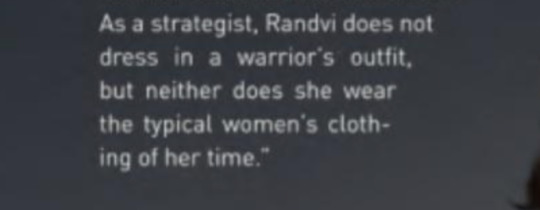
“As a strategist, Randvi does not dress in a warrior’s outfit, but neither does she wear the typical women’s clothing of her time.”
Which...seems to imply that being a strategist (a role that primarily involves her being behind a table), is automatically at odds with wearing a dress. Even if 9th century Scandinavian clothing was restrictive (it isn’t - We’re well, well before the days of tightlacing here, and women had to be able to go about their daily chores, and even IN the days of tightlacing as the peak of fashion, plenty of women didn’t, or went about their daily chores), she’s not doing anything that involves intense manual labor. Putting her in pants is simply a way of saying “Look! Look at Randvi! Look at how independent she is!” which....actually doesn’t work, when almost EVERY OTHER major female NPC is ALSO in pants. Including Valka who, as a völva, ergo a non-combatant role that mostly involves eating shrooms in her huts, has no practical need for pants, even if, once again, the clothing was impractical. If I didn’t know What A 9th Century Norsewoman Should Look Like, I would just assume that this was something that all noblewomen did.
It’s very rare to see women actively weaving, as I’ve discussed before, with Eivor only weaving as one of the disguises that she can take to blend in. As a shieldmaiden who’s up and about constantly, I honestly wouldn’t expect Eivor to devote that much time to weaving, but it is a little jarring when the women who are constantly at the settlement don’t so much as mention it, since this was a great opportunity for women to get together, share gossip, tell tales, talk shit about the men, etc. in their own spaces. And there was a bit of an anxiety around it, because, while this was a necessary function for the creation of clothing (which, in the game, seems to just materialize in chests over the game world), it also was tightly associated with magic and sorcery. (Hence why there was a stigma against men practicing magic....unless you’re Odin, in which case Loki will talk shit about you but is anyone else? No. Because you’re Odin.) I want to emphasize that my issue here isn’t “STAY IN THE KITCHEN AND BE A PROPER WOMAN, EIVOR”, it’s more....erasing what the vast majority of women in the Viking Age DID.
The closest we get to more traditional, more conventional women would be in the form of the religious women, but, from the Anchoress to the one murderous nun in the mysteries event to Frideswid in the Lunden Arc to Acha in the Lincolnscire arc, they tend to be portrayed as either zealous and evil or confused and easily manipulated, which ignores the reality for many medieval women, which is that, for many women who didn’t want marriage for one reason or another (whether it was that they were facing the possibility of a forced marriage, or they had no dowry, or they were lesbians, or they were ace, or they were any combination of those things), it was their one chance at a life of their own. I’m not saying that it was IDEAL, or that the medieval church was ideal, but it did give them options (that, incidentally, in the pre-Christian times....you didn’t have. Which is why I don’t attach any real sense of horror to Christianity coming to Ireland, at LEAST from the standpoint of women’s rights. There are other aspects to that, but we’re here, in 9th century England, so I won’t go into it.) No, it has to come from some moral defect, otherwise, they would be independent, like Eivor, like Randvi, like Petra, like Eadwyn, like Valdis, or even like Fulke, who is a religious figure referenced, extensively, as mad and heretical, but who makes a large impact on the plot and at least earns some level of respect, as opposed to the others who make relatively brief appearances.
Now, when discussing women warriors, there tends to be some moral value attached to it: “Women warriors DIDN’T EXIST, and if you argue that they DID, you just want women to be men, ignoring that non-femme women might find comfort in the knowledge that they aren’t alone”, often with a sense of moral guilt-tripping over “Erasing women’s suffering” (which also falls into the trap of assuming that being a woman = suffering, or that that’s the defining experience of being a woman) VS “Women warriors EXISTED and they were #NotLikeOtherGirls and that’s ALL we’re going to talk about as far as women at the time, as well as ignoring any potential evidence for trans or otherwise nonbinary identities”. Both options have the potential to erase or diminish what either option can mean to people. I hate both options equally, and I find that the way they’re brought in is incredibly manipulative. I’m not interested in saying that putting an axe in a woman’s hand = setting back feminism for twenty years. I’m not interested in saying that having essentially no more conventional women in the main cast = feminism. Both are bad, but what I’m concerned about is the lack of nuance in Valhalla and how it seems to assume that there’s ONLY ONE WAY to have power. (I’d hoped that Lady Eadwyn would be cool, and she is....even though we only see her in armor, she’s kind of what I would expect from a medieval woman, in the sense that her husband was Ealdorman and now she’s following in his footsteps, defending her rights as his widow, but then we replace her with a dude.)
As someone whose relationship to gender is Weird, I actually really, really enjoy playing a female character who has the kind of independence that Eivor has - I enjoy getting to jump around, killing things in a gloriously rendered historical environment. I enjoy that, with the exception of Dag, no one really questions it (though I would have been down for a more in-depth examination of gender in the Viking Age). I enjoy that Eivor is compassionate, clever, and aggressive, and that she’s able to have romances with both sexes. I’m not trying to nuke her via historical accuracy here (especially since the historical reality of shieldmaidens is SUCH a hot topic, I feel like wading into either end of the historical accuracy pool is a recipe for disaster) because I actually really, really like her as a character. There are relatively few times where I really, really identify with and love a main female video game character, especially since, so often, even into the present, when things are supposed to be better, I can still TELL that they were made by and for straight men, and this is one. What I AM saying is that I hate that it comes at the expense of basically every woman who ISN’T a warrior or otherwise “independent” by the game’s standards. You do have merchant women, the tattoo artist in camp, Valka, as mentioned before, but it all goes back to that point - We never really see a prominent woman running the household, managing the money, giving orders, which was an immensely important, powerful job, and as a result, it always feels kind of halfway done, that we’re over-representing one relationship to gender at the expense of another.
5 notes
·
View notes